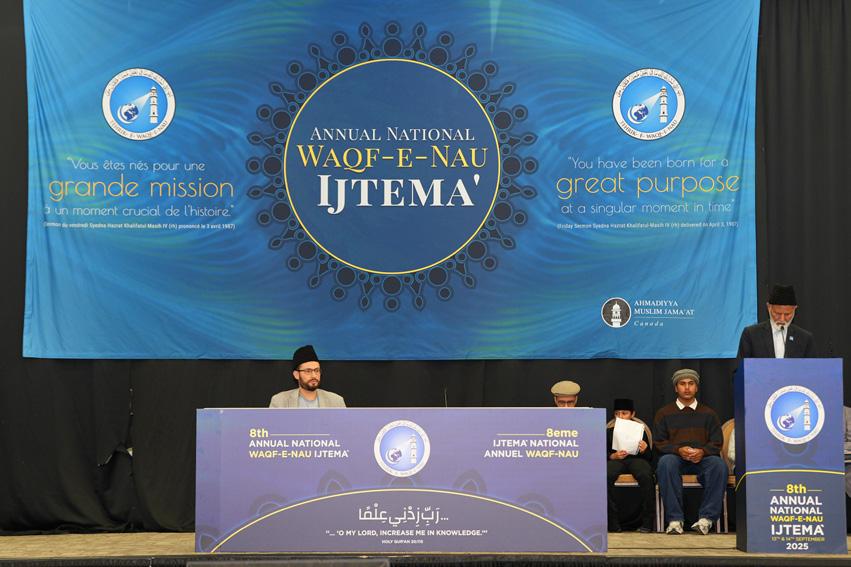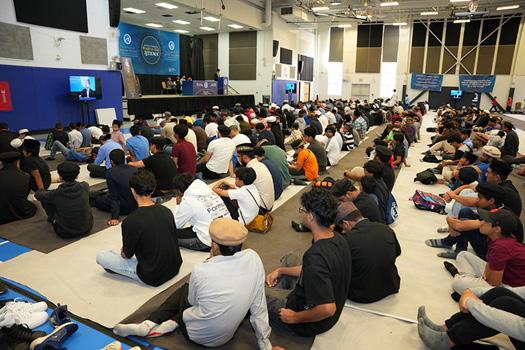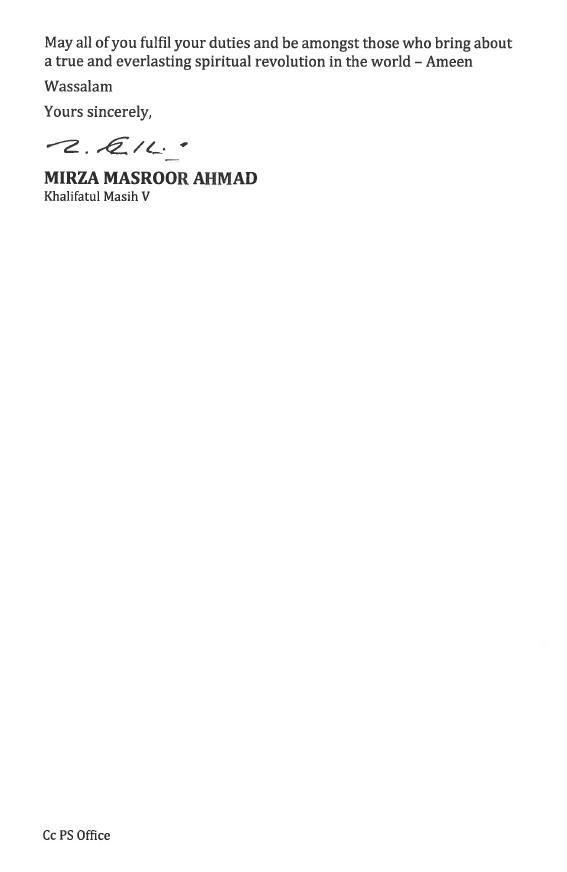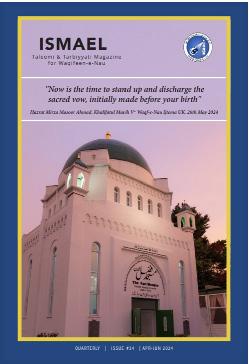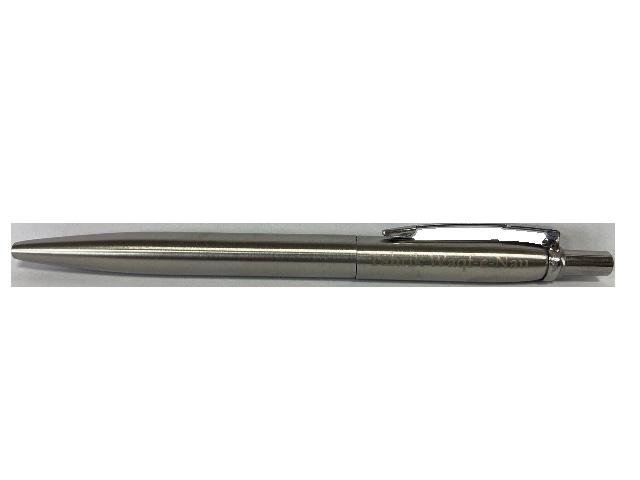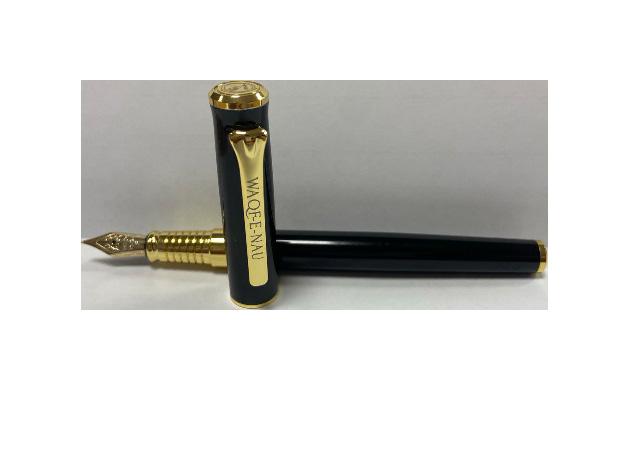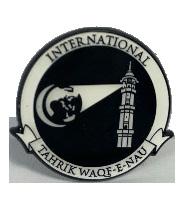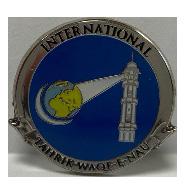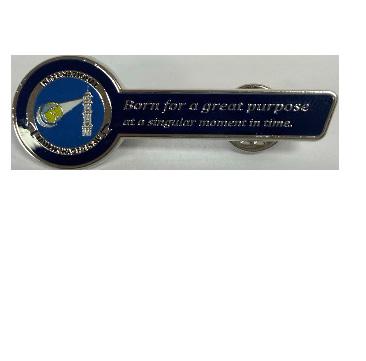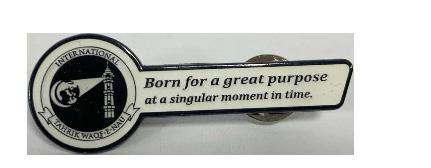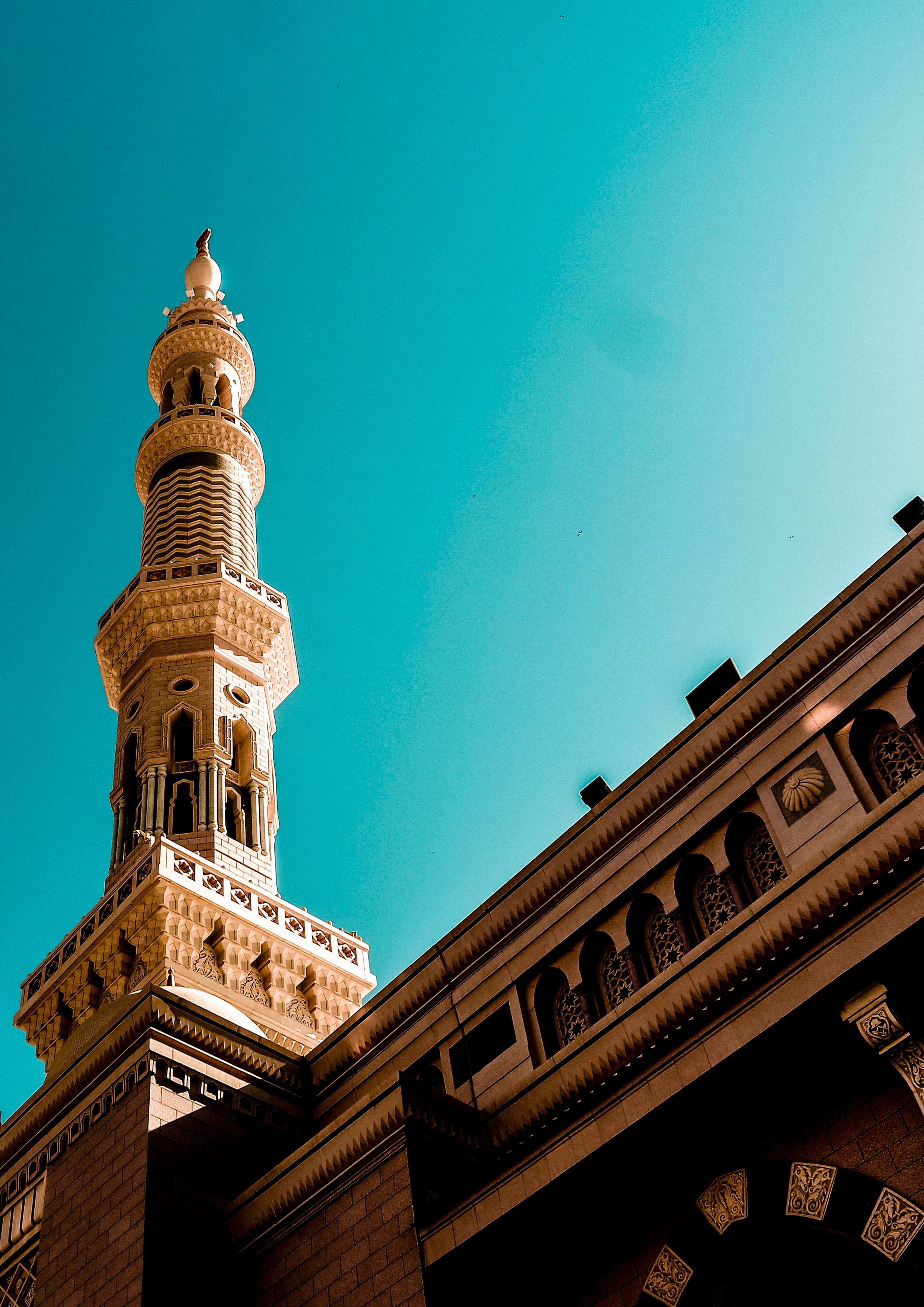
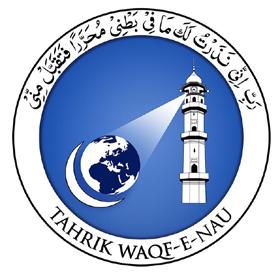
“The
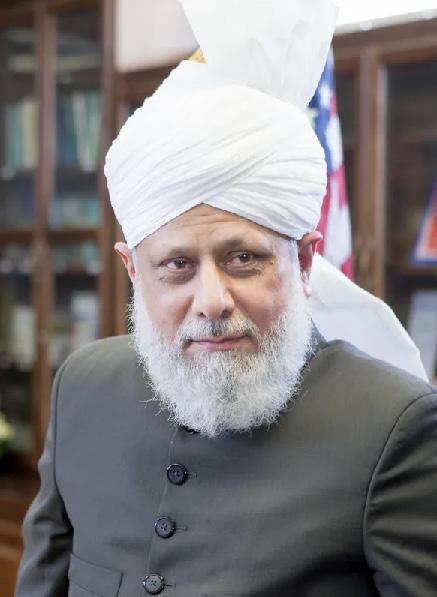
WAQF-E-NAU (CENTRAL)
+44 (0)20 8544 7633
+44 (0)20 8544 7643
manager@ismaelmagazine.org editorenglish@ismaelmagazine.org editorurdu@ismaelmagazine.org
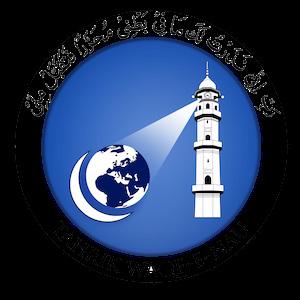



“The

WAQF-E-NAU (CENTRAL)
+44 (0)20 8544 7633
+44 (0)20 8544 7643
manager@ismaelmagazine.org editorenglish@ismaelmagazine.org editorurdu@ismaelmagazine.org

To subscribe to the Ismael Magazine contact your National Secretary Waqf-e-Nau
UK- Abdul Quddus Arif waqfenau@ahmadiyyauk.org
Canada - Musleh Shanboor waqfnau@ahmadiyya.ca
USA - Mirza Harris Ahmad national.wn@ahmadiyya.us
Australia - Syed Wadood Janud wfnaustralia@gmail.com
Spain - Tarik Ataul Munim nac.sec.waqfenau@islamahmadia.es
Belgium - Munir Ahmed Anjum waqfe.nau@ahmadiyya.be
Ghana - Hafiz Abdullah Mohammad Sani waqf-e-nau@ahmadiyya.org.gh
Switzerland - Jariullah Zafarullah Sahib waqfenau@ahmadiyya.ch
Ireland - Attaur Rehman Khalid waqfenau@islamahmadiyya.ie
Mauritius - Mohsin Ahmad Ramjeet waqfenaumauritius@gmail.com
Sierra Leone - Shahid M. Korjie waqfenau.sl@gmail.com
New Zealand - Muhammad Yaseen yasinsec681@hotmail.com
France - Usama Chaudhry waqfenau@ahmadiyya.fr













Chief Editor & Manager: Luqman Ahmed Kishwar



























The Holy Prophet’ssa love of God before Prophethood
Tamseel Ahmed Rana
The Holy Prophet’ssa Deep Love for Allah
Nasir Bin Wahab Yeboah
Nandana Fort & Al-Biruni
Dr M. Masood Ul Hassan Nuri Sahib
A Mothers Wish, A Sons Life
Luqman Ahmed 42 In The Spotlight
Rizwan Safir 48 Report for National Waqfe Nau Ijtema Canada 2025
Assistant Manager: Touqeer Tanvir
English Editor: Talat Syam
Urdu Editor: Farrukh Raheel
Editorial Team: Farukh Arshad
Talat Syam
Content manager: Noman Ahmed
Cover design:
Labeed Mirza
Designing Team:
Talat Syam (Lead Designer)
Masroor Ahmad
Danish Manan
Sheharyar Khurram Bajwa
Mustansar Ahmad
Ibtesam Talha
Proofreading: Sadiq Ahmed
Humza Sikander
Printers: Warners Midlands



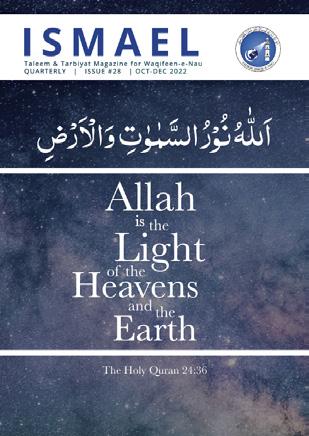
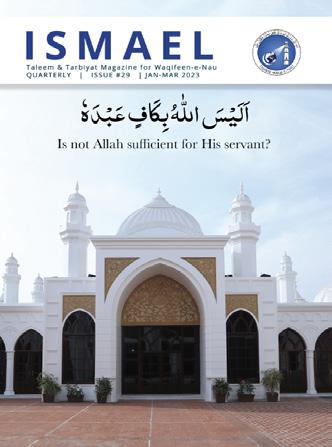
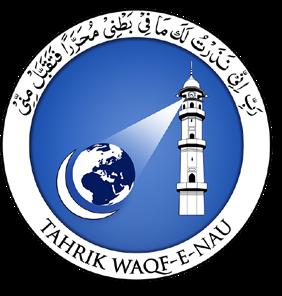
By the grace of Allah Ta'ala, Waqifeen-e-Nau are now spread across the globe, many of whom are studying in their respective fields while others have already fulfilled their pledge of dedicating their lives for the Jama’at. There are many who are Missionaries, practising Doctors, Television producers, Architects, Graphic designers, Engineers, Accountants and much more.
Ismael is an international magazine, which was launched in 2012 by Hazrat Khalifatul-Masih the fifthaba specifically for the Waqifeen-e-Nau around the world. At this auspicious occasion, addressing the Waqifeen-e-Nau Huzoor-e-Anwaraba wrote:
“The magazine has been named as “ISMAEL”, which reminds us of the sacrifices made by Hazrat Ismaelas and by Hazrat Hajiraas who spent their lives in a desolate and barren place and instituted exceptional standards of sacrifices for the sake of religion. Likewise, it is expected of every Waqf to uphold the covenant of Waqf (dedication) made by their parents even before their birth, who have in turn themselves reaffirmed the same.”
Waqifeen-e-Nau can contribute by sending articles regarding their respective fields of studies. This magazine is published on a quarterly basis as a platform for the Waqifeen-e-Nau to get in touch and express what they have always wanted to. To subscribe to this magazine, you can contact your National Waqf-e-Nau Secretary. You can also read and download the magazine online at: www.waqfenauintl.org/ resources/ismael
Remember, this magazine is for the Waqifeen-e-Nau, prepared by the Waqifeen-eNau. Everyone is welcome to send their articles, contributions and comments. Ismael magazine is the central magazine for Waqifeen-e-Nau from around the globe.
Say, ‘If you love Allah, follow me: then will Allah love you and forgive you your faults. And Allah is Most Forgiving, Merciful.’
The Holy Qur'an 2:178
The Prophetsa used to offer night prayers till his feet became swollen. Somebody said, to him, “Allah has forgiven you, your faults of the past and those to follow.” On that, he said, “Shouldn’t I be a thankful slave of Allah?”
Sahih al-Bukhari 4836

Have you any notion what was the strange event that occurred in the wasteland of Arabia when hundreds of thousands of the dead were revived within a few days, and those who had been misguided through generations exhibited Divine complexion, and those who were blind began to see, and those who had been dumb began to utter words of Divine wisdom, and the world underwent a revolution which no eye had seen before and no ear had heard of. Do you know how all this came about? It was the supplications during dark nights of one who had lost himself in God which caused a revolution in the world, and showed such wonders as could never have been expected from that Unlettered and Helpless one [the Holy Prophetsa].
Blessings of Prayer Pg 17 (English)
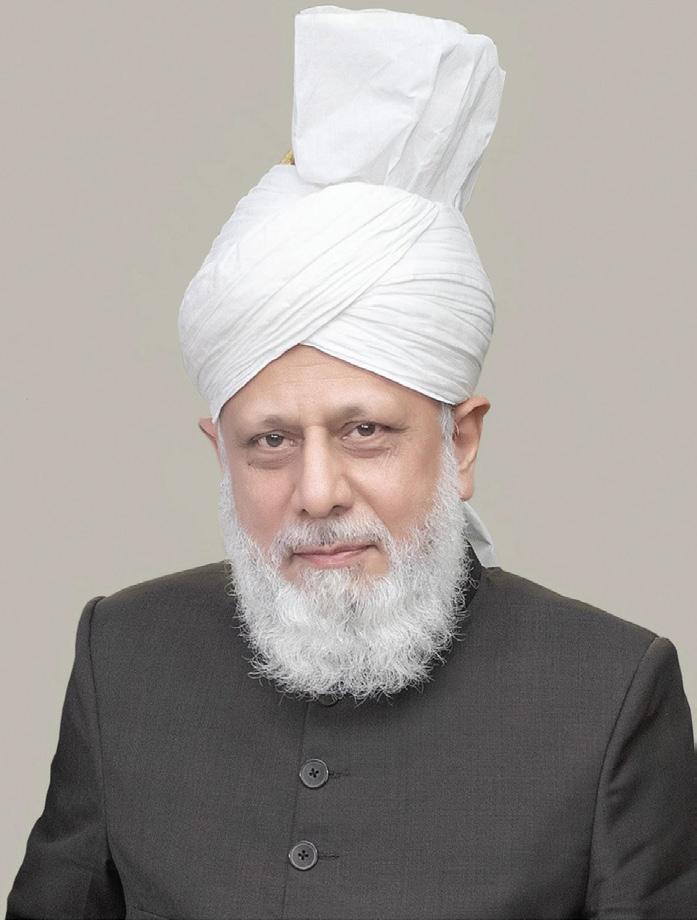
“The Holy Prophet Muhammadsa was the Muhsin-eInsaaniyyat (Benefactor of Mankind), the Rahmatul-LilAalameen (Mercy for all Mankind) and the Beloved of God who would stay awake all night in deep anguish that humanity be saved from ruin. He would express such agony and sorrow to alleviate the pains of mankind that the God of the Heavens, addressing the Holy Prophetsa, stated that would he grieve himself to death in sorrow for those who did not believe in the Creator?”
Hazrat Mirza Masroor Ahmadaa
English Translation of the Friday Sermon Delivered on September 21, 2012

Huzoor’saa address to Khuddam and Atfal at UK Ijtema 2025
“Every Ahmadi youth has the potential to become a shining star of Ahmadiyyat”
Report Taken From Al-Hakam
Official Report of the Concluding Session by Hazrat
Khalifatul Masih Vaa at the National Khuddam and Atfal Ijtema UK on the 21st September 2025
From 19-21 September 2025, Majlis Khuddam-ul-Ahmadiyya UK convened their annual ijtema in Hook Lane, Puttenham. On the final day, Hazrat Amirul Momineen, Khalifatul Masih V, may Allah be his Helper, graced the occasion, delivering an address to formally conclude the ijtema.
At approximately 3:30 pm local time, the formal proceedings of the final session of MKA UK’s national ijtema commenced. Huzooraa invited Ehsan Ahmad Sahib to recite a portion of the Holy Quran. He recited verses 48-50 of Surah al-‘Ankabut, and Syed Sajeel Ahmad Shah Sahib presented their English translation.
Hazrat Khalifatul Masih Vaa then came to the podium, leading all those present in taking the Khuddam-ul-Ahmadiyya pledge. Thereafter, Huzooraa invited Abdul Hai Sarmad Sahib to recite an Urdu poem written by the Promised Messiahas. Safwan Akbar Sahib presented the English translation of the couplets.
Huzooraa then invited Abdul Quddus Arif Sahib, Sadr Majlis Khuddam-ulAhmadiyya UK, to present the ijtema report. Sadr Sahib said that the theme for this year’s ijtema, graciously given to them by Huzooraa, was “The Holy Quran: A casket of jewels”.
He then mentioned key highlights of the ijtema, i.e., unplug talks on religion and contemporary issues, exhibitions dedicated to the Holy Quran and science, inspirational talks on Khilafat, academic
excellence and becoming strong Ahmadis, etc. The total attendance at this year’s ijtema was 7,996.
He then thanked all the volunteers and khuddam who helped make the ijtema successful. Sadr Sahib expressed heartfelt gratitude to Hazrat Khalifatul Masih Vaa for honouring the event with his presence and for his continuous prayers, which were instrumental in the success of the ijtema.
Thereafter, a short video presentation was shown to Huzooraa with highlights of the ijtema. Motamid sahib Majlis Khuddamul-Ahmadiyya UK was called to announce the Alam-e-Inami prize for Atfal-ulAhmadiyya and Khuddam-ul-Ahmadiyya, which Huzooraa awarded to the winning qiadats.
At 3:55 pm, Hazrat Khalifatul Masih Vaa came to the podium to deliver his address. A brief summary of this address is as follows:
The core objective of ijtema is to instil the love for Allah, and elevate the intellectual, moral and spiritual standards of their members. Huzooraa said that he had personally observed that children ask insightful questions, which shows that they can comprehend religious concepts at a young age. Keeping this in mind, Huzooraa said that he wished to discuss how khuddam and atfal could best fulfil their religious objectives in today’s world.
At ijtema, khuddam have the opportunity to participate in sports and games. But the main priority should not be on the game
or on who wins or loses. The primary objective for holding sports events is to help members develop physical strength and fitness, so that they can fulfil the rights of Allah and pay attention to their religious and educational development.
Unfortunately, many young people today spend all their free time online, watching TV or playing video games, instead of going outside and engaging in healthy activities. Thus, sports at the ijtema are designed to encourage the members to be outdoors, get fresh air and improve fitness.
The purpose of getting fit should not be vanity or desire or to gain dominance over others. Instead, a healthy person has a greater capacity to fulfil their life’s objectives. Sports and outdoor games also offer a positive way to relax and refresh one’s mind. This can help individuals study more effectively by enhancing focus and mental aptitude.
Thus, the real objective of our sports events and competitions is not to win or lose. We should not act like those worldly people who often consider sports as a matter of life and death. Such people get into heated arguments, brawls or resort to foul play to gain an advantage.
Even among Ahmadis, personal interest or ego can sometimes lead to poor behaviour. Huzooraa cited the example of the Masroor Cricket Tournament, which was cancelled because it was felt that instead of fostering brotherhood, it was causing friction because of personal interest and egos.
Ahmadis must exhibit a true spirit of sportsmanship when they play sports. An exceptional standard of tolerance and respect should distinguish Ahmadi youth
from others. Otherwise, what is the benefit of being an Ahmadi if we do not exhibit high moral standards?
Idly watching tv or scrolling endlessly can damage your physical and mental health. The internet also has a lot dangerous and immoral content, which serves to erode moral values and fuel hate. AI is now adding a new dimension.
There have been horrific reports of teenagers committing suicide because of cyberbullying or consuming appalling online content that causes serious mental harm. Huzooraa cited the example of a teenager in the USA who committed suicide with the help and encouragement of ChatGPT.
Violent videos and extremist ideologies promoting hate have flooded the internet and are causing immense harm to society. Just a few days ago, after a prominent political activist was killed in America, the state governor urged the public to switch off their devices, go outside, spend time with their families and serve their communities.
By the grace of Allah, through the guidance of Khilafat, Ahmadis are warned from a young age about the perils of contemporary society. If we look back to the time of Hazrat Musleh-e-Maudra, we observe that he paid close attention to the moral training of different groups of people according to their capabilities and environment.
He established Majlis Khuddam-ulAhmadiyya and directed Ahmadi youth according to their age and potential. He bestowed upon Khuddam-ul-Ahmadiyya a momentous and profound slogan: “Nations cannot be reformed without the reformation of their youth.”
This is an immense and profound challenge for all khuddam to rise to. These words bear witness to the fact that it lies upon khuddam to spiritually and morally reform their nations. It lies upon khuddam to guide the world to true peace and prosperity; to strive tirelessly to fulfil the mission of the Promised Messiahas.
But khuddam must first look inwards before seeking to reform others. It is the personal reformation of every Ahmadi youth that shall lay the foundation for a glorious spiritual, moral, and intellectual revolution in the world. This is what the slogan truly represents.
Being physically fit will help further these objectives.
Various studies prove that people who are physically fit are better able to control their emotions and make sound judgements. They can contribute positively to the wider world since they have a mature and insightful thought-process.
indispensable nature of the Quran and its limitless blessings.
Completing the Quran for the first time should mark just the beginning of a lifelong ever deepening bond with the words of God. All khuddam and atfal should recite the Holy Quran daily, understand its meanings, sincerely strive to act upon its teachings. The Quran should be the means of reformation and of forging a close bond with Allah the Almighty.
We must also study the blessed life and character of the Holy Prophetsa because his entire life is a timeless example for us to learn from and emulate. Allah the Almighty has stated that if a person wishes to gain His nearness, they should try to tread upon the path of the Holy Prophetsa.
“Nations cannot be reformed without the reformation of their youth.”
The core philosophy underpinning this profound slogan is that if khuddam and atfal diligently seek to develop their characters and conduct, every Ahmadi youth has the potential to become a shining star of Ahmadiyyat.
We must remember that the primary means of gaining religious knowledge is the study of the Holy Quran. Just as we require food and water to fuel our physical bodies, Allah has bestowed upon us, through the Holy Prophetsa, the Holy Quran as a source of everlasting spiritual sustenance to our souls. Huzooraa chose this year’s theme to emphasise to all the khuddam the
Every word and deed of the Holy Prophetsa was in perfect harmony with the teachings of the Holy Quran. So, it is the noble example of the Holy Prophetsa that we should always try to follow. Only then can we live as true Ahmadi Muslims; fulfil our pledge to give precedence to faith over world matters; and assist in the divine mission of the Promised Messiahas.
Huzooraa said that we must prioritise developing our relationship and bond with God every single day. We should set aside a specific time each day for reciting the Holy Quran and studying it. If we sincerely try for this, we will insha-Allah witness a magnificent spiritual and moral transformation in our lives.
The Holy Prophetsa would pray for

incredibly long periods with intense fervour and concentration. He would remain immersed by the love of Allah the Almighty. We must constantly try to follow his example as Allah has proclaimed him the ultimate role model and best example for all mankind. We must remember Allah and fulfil the rights of His worship at all time and circumstances.
If anyone is fortunate enough to excel in their studies, or achieve a high rank in their profession, they should never attribute their success to their own qualities or virtues. Instead, we should always consider every success and blessing to be purely due to the grace and mercy of Allah.
The Holy Prophetsa expressed great anger towards those people who neglect their prayers, and stated that it can take one to a state of disbelief. Every Ahmadi must therefore also prioritise their daily prayers and worship.
Another fundamental virtue instructed by the Holy Quran is truth. We must hold fast to the truth in every situation, no matter how difficult or challenging. The Holy Prophetsa desired for his followers to uphold the highest standards of truth and honesty. He listed falsehood as a major sin, listing it alongside shirk and unjustly taking a life.
The Holy Prophetsa explained that a person lies or makes promises they do not intend to fulfil, it is because they seek to unjustly seize their rights of others. They are driven to falsehood in order to serve their own interest at the expense of others. Thus, every Ahmadi must ensure that they maintain the highest change of truth and integrity. Absolute honesty ought to be the hallmark of every Ahmadi.
Huzooraa also advised against gossiping, spreading rumours, exaggerating the truth, distressing others or fuelling hatred. He said that Ahmadis must use social media for spreading positivity and truth. They must convey the commands of Allah the Almighty, the teachings of the Holy Prophetsa and the moral and spiritual lessons of the Promised Messiahas.
Huzooraa said that is a cause of regret that some young Ahmadi women write and express their grief because their husbands or in-laws forbid them from seeing their own families. Such behaviour is a direct violation of the teachings of Islam. And those guilty of such cruelty should reform themselves and treat their wife and daughter-in-law with love and compassion.
In the end, Huzooraa reiterated the importance of studying the Holy Quran.
Only if we collectively truly live by its teachings can we spark a genuine spiritual and moral revolution in the world. Huzooraa prayed that Allah the Almighty grant us the ability to do so and may we all become true shining stars of Ahmadiyyat.
Then, Hazrat Khalifatul Masih Vaa led everyone in a silent prayer and the ijtema concluded.
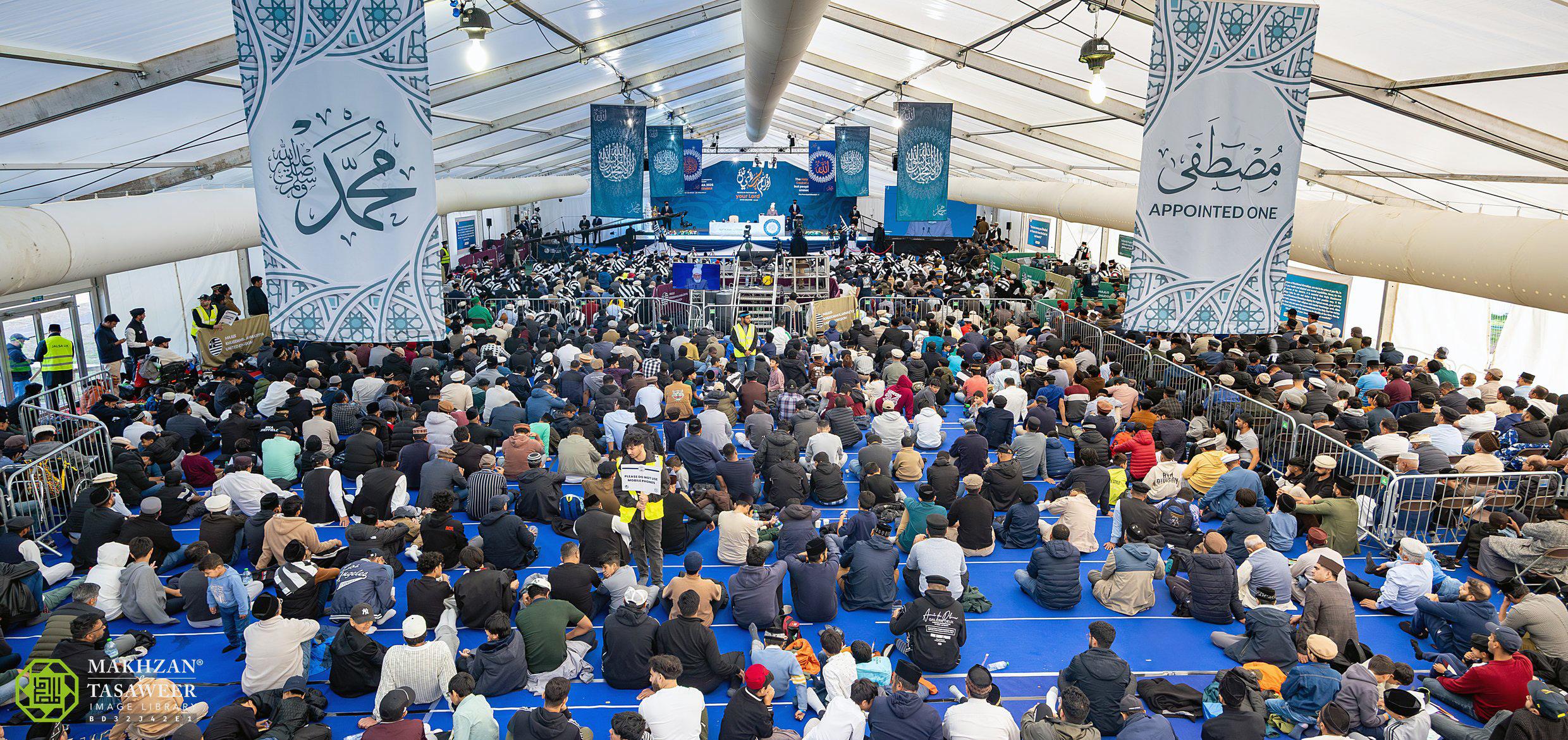

Muttahir Ahmed Absaar
Brisbane Queensland, Australia
The Holy Prophetsa of Islam was a man of love. He was a loving husband, a devoted father, and a faithful companion. His heart overflowed with compassion for the poor, the weak, and the oppressed. He was gentle towards children and merciful even to animals. Yet, while his kindness embraced all of creation, the love that dominated his heart above every other was his love for Allah Almighty. It was in this love that he surpassed every creature and stands forever as the perfect exemplar. It is this all-consuming devotion that I will endeavour to reflect upon, for his love of Allah found expression in worship, in obedience, in faithfulness, and in every moment of his life.
Even before he assumed the mantle of prophethood, his heart was set apart by purity and devotion. Though his youth was spent in the corrupt and idolatrous society of Makkah, he never bowed before an idol nor engaged in the frivolous pursuits of his people. He rejected the vices of his time, retreating instead to the cave of Hira, where he spent days and nights in solitude, worshipping his Creator. It was there that he received the first

revelation and the Divine call which changed the course of human history.
From that moment on, every aspect of his life bore witness to his supreme love for Allah. No trial could shake his resolve, no temptation could weaken his devotion. When the leaders of Makkah tried to lure him with promises of wealth, power, and status if only he would abandon his message, his reply was firm and unforgettable: “If they were to place the sun on my right hand and the moon on my left, I would never desist from proclaiming the truth entrusted to me by God.”1 Such words were not rhetoric, but testimony of a heart wholly surrendered to its Lord.
His devotion reached its highest expression in worship. Though burdened with the immense responsibilities of guiding mankind, he would rise at midnight and stand in prayer until dawn. He prayed until his blessed feet became swollen, and he wept until his chest heaved like a boiling pot. His prayer mat would often be soaked with tears. When Hazrat A’ishahra asked why he strove so hard despite being assured of forgiveness,
he replied: “Should I not then be a grateful servant?”2 His worship was not born of fear but of gratitude and love.
This love was not confined to the hours of prayer. Every moment of his life was filled with the remembrance of Allah. He supplicated upon rising in the morning and before retiring at night; when entering or leaving his home; when beginning and finishing a meal, when travelling or donning new clothes. Among his oft-recited supplications was this: “O Allah, grant me Thy love and the love of those who love Thee, and the love of those deeds which enable me to attain Thy love. O Allah, make Thy love dearer to me than my life, my family, and [dearer even than] cold water to a thirsty soul.”3
Even his enemies recognised this devotion. In Makkah, they would often remark: “Muhammad is intoxicated with the love of his Lord.” Such was the passion of his heart for Allah. Where there is love, there is also jealousy for the honour of the beloved.
He commanded them to respond, and together they cried: “Allah alone is Great and Mighty! He alone is High and Honoured!” His personal safety mattered little; what pierced his heart was any insult to the majesty of Allah.
The same devotion was evident when he returned to Makkah as a conqueror. After years of persecution, he might have sought revenge or worldly satisfaction. Instead, he went directly to the Ka‘bah, circled it in worship, and ordered the destruction of its 360 idols. Only when the sanctuary was restored to the worship of the One True God did his soul find peace.














After the Battle of Uhud, when the Muslims were wounded and weary, the enemy shouted in triumph that their idol Hubal had prevailed. At first, the Holy Prophetsa forbade his companions from replying, but when the glory of Allah was challenged, he could no longer remain silent.




His love was tested also through grief and loss. He was born an orphan, lost his mother in childhood, and later endured the deaths of his beloved wife Khadijahra, his uncle Abu Talib, and several of his children. When his infant son Ibrahim passed away, he wept with tender grief, saying: “The eyes shed tears and the heart grieves, but we say nothing except that which pleases our Lord. Ibrahim, we grieve sorely thy parting. To Allah we belong and to Him shall we return” 4 Even in grief, he sought only the pleasure of Allah.



















On that same day, a solar eclipse occurred, and people claimed it was a sign of condolence from God. The Holy Prophetsa however, would not permit such
error. He declared: “The sun and moon do not eclipse because of the death or life of anyone, but they are two of the signs of Allah.”5
Love for Allah also demanded justice without compromise. When the daughter of a noble chief was caught stealing, people sought leniency, and even Usamah bin Zaidra, whom the Holy Prophetsa loved dearly, interceded. The Holy Prophetsa grew stern and declared:
“By Allah, if Fatimah, the daughter of Muhammad, were to steal, I would cut off her hand.”6
His loyalty to Allah’s command outweighed all worldly bonds, even those of family.
Western critics have often ignored these truths, choosing instead to malign his character. Yet history bears witness that every action of the Holy Prophetsa was shaped by love of Allah Almighty. That love was the thread that bound together his worship, his mercy, his justice, and his patience.
At the end of his life, when given the choice to remain in this world or
return to his Lord, his heart yearned for reunion. His final words were: “To the companionship of the Exalted Friend.”7 Thus, even in death, his last breath was an act of love for Allah. The Holy Qur’an itself testifies to his devotion: “Say, ‘My Prayer and my sacrifice and my life and my death are all for Allah, the Lord of the worlds. He has no partner. And so am I commanded, and I am the first of those who submit.”8
From the cave of Hira to the conquest of Makkah, from nights of tearful prayer to moments of grief and loss, from justice uncompromising to his final breath, every aspect of his life was governed by love for Allah. Whatever view one may take of his claim to prophethood, one truth is beyond dispute: no impostor could have lived and died with such sincerity, such devotion, and such unwavering fidelity. His love for Allah was absolute, and Allah in turn raised him above all creation. May peace and blessings be upon him.
For us as Waqifeen-e-Nau, the example of the Holy Prophetsa is not a distant tale but a guide for our own lives. In a world filled with distractions, the pressure of studies, and the pursuit of careers, his devotion reminds us that the true purpose of our dedication is to seek the love of Allah. Our waqf will only be meaningful if it
reflects the same spirit of obedience in hardship, gratitude in worship, and mercy in service. By holding firmly to prayer, cultivating remembrance of Allah, and remaining loyal to Khilafat, which is the reflection of the Prophet’s love today, we too can strive to make our lives a testimony that we belong wholly to Allah Almighty.
References:
1. Ibn Hisham vol.1, p.265-266
2. Sahih al-Bukhari
3. At- Tirmidhi, Riyad as-Salihin 1490
4. Sahih al-Bukhari
5. Sahih al-Bukhari
6. Sahih al-Bukhari
7. Sahih al-Bukhari
8. Surah Al-An‘am, 6:163-164
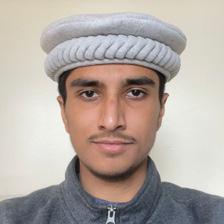
Our beloved Prophetsa was the Greatest Lover of God in all of existence. His ultimate rank is a direct result of his unsurpassable love for God Almighty. Prophethood was not randomly bestowed upon the Holy Prophetsa rather it was his intense love of God that caused God Almighty to grant him the greatest of all favours - the Holy Quran. Therefore God Almighty says in the Holy Quran:
Rather all those nights in the cave, all those mornings in Makkah, all those evenings in the house with Hazrat Khadijara, all that time spent walking about the streets of the city, not a moment passed where our Noble Prophetsawas not lost in his search for God, that he lost all awareness of himself, he wanted only one Being - Allah.
“And He found thee wandering in search for Him and guided thee unto Himself.”1
By other Muslims, the word لُاََضَ is misunderstood in this verse to mean astray, however in this context it means that the Holy Prophetsa was so absorbed and lost in search for his Creator that all else was lost to him. Hazrat Musleh Maudra has translated this verse as follows:
“When I found you in such intoxication for My love that you did not have any awareness of your hands or feet, and when you were lost in the love of God in such a way that you had no awareness of yourself, at this time I guided you.” He then continues “The real meaning of لُاضَ means being intoxicated and lost in love, and the Holy Quran itself bears witness that the Holy Prophetsa was never astray and misguided”2
This clarifies the state of the noble Prophetsa before his prophethood. All those nights in the cave of Hira were not spent in meditation like the yogis or pandits of India, or like the westerners of the current age.
This state, longing, and prayers surpassed all the Prophets, and in fact all of creation, that the greatest light, rank, and status was bestowed on the blessed Prophetsa as a result. The Promised Messiahas explains:
“Have you any notion what was the strange event that occurred in the wasteland of Arabia when hundreds of thousands of the dead were revived within a few days, and those who had been misguided through generations exhibited Divine complexion, and those who were blind began to see, and those who had been dumb began to utter words of Divine wisdom, and the world underwent a revolution which no eye had seen before and no ear had heard of. Do you know how all this came about? It was the supplications during dark nights of one who had lost himself in God which caused a revolution in the world, and showed such wonders as could never have been expected from that Unlettered and Helpless one (The Holy Prophet)”3
This passage highlights the state of the Prophetsa before prophethood. Some scholars and common Muslims are under the impression that before Prophethood some Prophets can be upon polytheism (God Forbid), and prophethood is suddenly
bestowed upon a man, but it is clarified by the Promised Messiahas that before Prophethood, the Holy Prophetsa was lost in the love of God, and this love for God led him to pray intensely for his nation’s reformation, and this love of God and prayers caused a revolution in the world. This is true for all Prophets, all of them are righteous ones before prophethood, and believe in One God.
The Prophetsa was also considered Sadiq (Truthful) and Amin (Trustworthy) before Prophethood. His whole nation bore witness to his piety and righteousness and all looked upon him positively. This is also a proof of the Holy Prophet’ssa love for God, as he himself says:
“When Allah loves a person, He calls Gabriel saying, ‘Allah loves so-and-so; O Gabriel! Love him.’ Gabriel then loves him and make an announcement amongst the inhabitants of the Heaven. ‘Allah loves so-and-so, therefore you should love him also,’ and so all the inhabitants of the Heaven love him, and he is then granted the acceptance and approval of the people on the earth.”4
A deep and insightful point can be deduced from this hadith. It is well known that the Prophetsa was beloved by his people before prophethood, and the people accepted and approved of him. Therefore it is quite clear the Holy Prophetsa was always beloved to God, because God was beloved to himSA And this was true for the entirety of his life.
Furthermore, Imam Ghazali mentions in his book that:
pursuit for the Creator. Is it logical for one to presume that suddenly one day on the night of Ramadan love for Allah suddenly took place in the heart of the Prophetsa causing the descent of Iqra’? No, rather such a fiqra (word) is not bestowed randomly! This is not how love works. Love was already present there, and upon that love the light of God descended, and took hold of his being and caused a world to undergo a revolution.
Hazrat Zain ul Abidin Waliullah Shah Sahibra has explained the state of the Holy Prophetsa in depth before prophethood in his Urdu commentary of Sahih al Bukhari. Some points summarized from Volume 1, pg. 16-5 of the commentary are related deeply to the topic at hand. Hazrat Zain al Abidinra explains that the primary hadith on the state of the Prophetsa before prophethood says:
“And this is why the Arabs said: ‘Surely Muhammad has fallen madly in love with his Lord.’ when they saw him withdraw for worship in the cave of Hira”5
This makes it abundantly clear that Holy Prophet Muhammad’ssa whole life before and after prophethood was spent in this
“Then seclusion was endeared to him, and he used to withdraw to the cave of Hira, and devote himself therein”6
This hadith, and specifically this small quote from it gives us great insight and depth to the state of the Prophetsa. The hadith says:
meaning seclusion was endeared to him. The Holy Prophetsa had pure love for Allah Almighty in his heart, and this love kept progressing until he wished for seclusion and complete disconnection from the world only for the sake of his Creator. So this love of God Almighty was also not a result of only his efforts, rather the wording of this hadith shows that God Himself made seclusion dear to himsa, leading him to turn himself away from the whole world, and this is true in the case of all prophets. We learn from this that to have pure love of God, only our efforts alone cannot succeed, rather our efforts should go into prayers that God Himself bestows this love for Him upon us. His grace is the only thing that
will grant us this pure love. This quote also proves that the Holy Prophetsa did not hope for revelations, visions, and prophethood when worshipping, rather his worship was purely out of love, and prophethood was bestowed upon him without him expecting it:
Explaining this love, Maulana Rumirh has mentioned a great point in his Masnavi:
“O Moses! Those who know polite manners are one kind. (And) those whose soul and spirit are burning (with love) are another!”9
"And thou didst never expect that the Book would be revealed to thee; but it is a mercy from thy Lord”7
There are yet others who think that closeness to God can come upon a person with the single breath of a saint. They think that since they have done bai’at (pledge of allegiance) the next night they will receive revelation. But this is merely the beginning as love is a path of madness.Our Noble Prophetsa spent a long while lost in love and in pursuit of God, and afterwards he was guided, so if the Noble Prophetsacould not achieve God until he was lost in pursuit of God, how can we do so! Can the law of God be broken? Can a person reach their destination by taking the wrong path? The life of the Holy Prophetsa before prophethood exposes this great reality to us, that love of God requires from us, that we become lost in God.
Due to this, now God Almighty, till the Day of Judgement, has now made love and total obedience to the Prophetsa a condition in order to achieve His love. May peace and blessings be upon this Noble Prophetsa to whom all creation has become subservient due to his love of God!
In order to truly follow the path of the Prophetsa, along with outer actions and polite manners, we must create a fire of love within our hearts. The meaning of this metaphorical fire is a determination to attain the love of God and sacrifice everything for His sake.
This fire, stemming from the life and teachings of our Noble Prophetsa, is what our Beloved Huzooraa wishes from us. In order to truly serve our faith we must endeavour to follow the teachings of our Noble Prophetsa and be lost in God, then we will attain magnificent successes. May God Almighty grant us this great boon, and inspire our hearts to tread upon this difficult path. Ameen.
Join those, the lovers of Al-Rafeeq
With their glorious leader Muhammad! Upon a prayer mat, in prayer, die like the meek, And be invited to the court of Al-Samad!
References:
1. The Holy Qur›an 93:8
2. Irfan-e-Ilahi, Anwar ul Uloom, Vol. 4, pg. 348-347
3. The Blessings of Prayer pg. 17
4. Sahih al-Bukhari 7485
5. Ihya Uloom ud Din, Vol. 2, pg. 280
6. Sahih al Bukhari 3
7. Holy Quran 28:87
8. Holy Quran 3:32
“Say, ‘If you love Allah, follow me: then will Allah love you and forgive you your faults. And Allah is Most Forgiving, Merciful.”8
9. Masnavi II, 1764
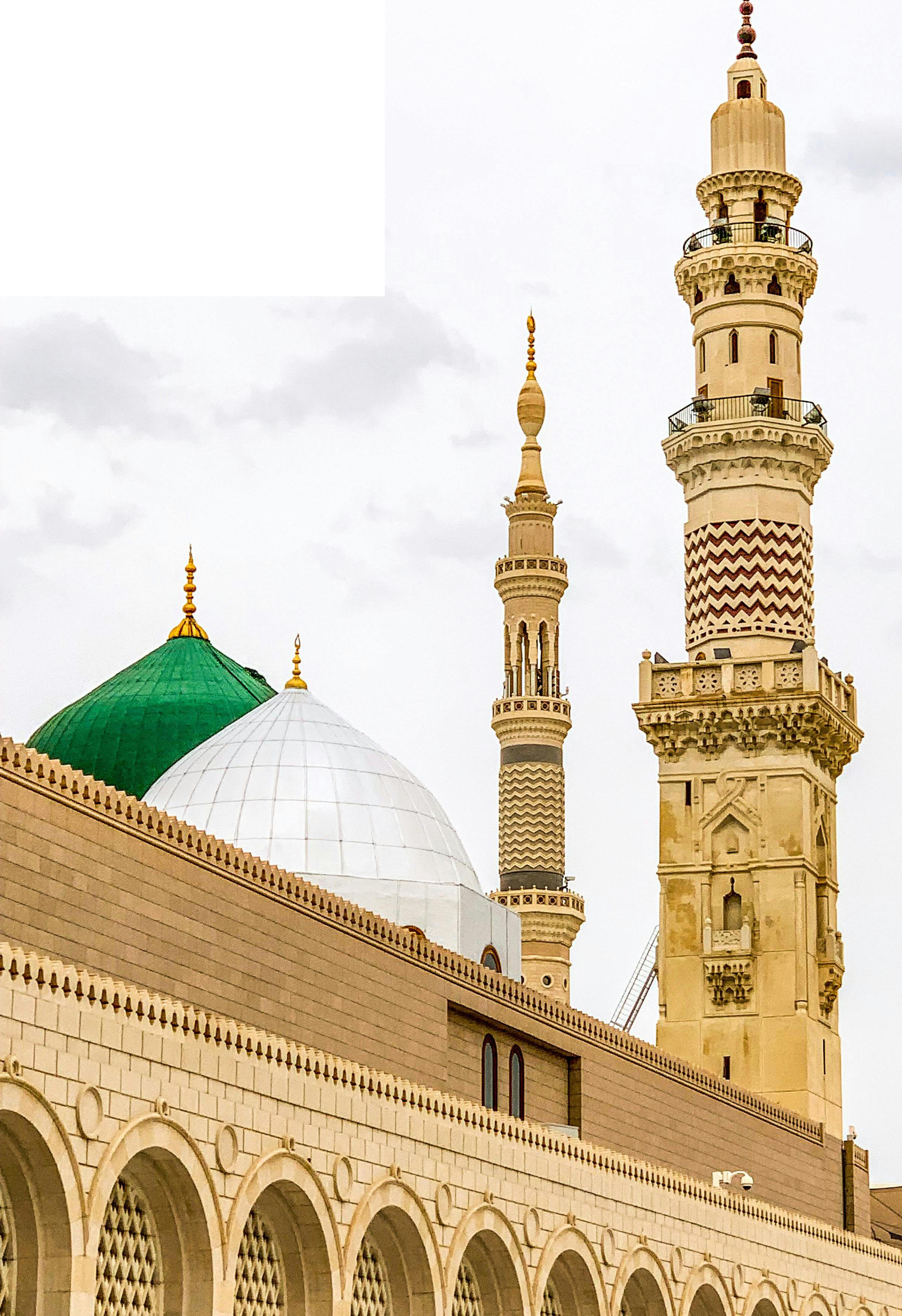
By Nasir Bin Wahab Yeboah
The life of the Holy Prophet Muhammadsa was a reflection of one central reality, an unbreakable bond of love with his Creator. His entire being, from his most private moments of prayer to his public life of leadership, testified that he lived only for Allah and in Allah. This love was not expressed in mere words but in a complete surrender of self, constant remembrance, and endless sacrifice and we can’t encapsulate in totality the depth of such love for one's Creator. In this article we will have a glimpse of such extraordinary love our beloved Prophet had for Allah Almighty.
The Holy Qur’an bears witness to the Holy Prophet’ssa role as the model of divine love. Allah commands, “Say, if you love Allah, then follow me; Allah will love you and forgive you your sins. And Allah is Most Forgiving, Merciful”.1 This verse establishes the Holy Prophetsa as the true mirror of divine love and the means of attaining it. His life shows how love for Allah is not a passive feeling but an active obedience, owing to following him sincerely is the path to win His love.
The Holy Prophet’ssa worship expressed deep affection and strong devotion with deep emotional attachment of his love for Allah Almighty. He would stand in prayer at night until his feet swelled. When asked why he endured such hardship even though
Allah had forgiven him, he replied, “Should I not then be a grateful servant?”. 2 This short answer revealed the depth of gratitude to Allah and that his worship was driven not by fear of punishment but by a desire to express complete devotion.
Hadīth literature is full of testimony to this love. In one report, the Holy Prophetsa said, “The most beloved of deeds to Allah are those done consistently, even if they are small”. 3 This shows how he taught his companions that love for Allah is nurtured by steady devotion, not grand displays. Another narration states: “None of you truly believes until I am more beloved to him than his father, his child, and all mankind”. 4 Love of the Holy Prophetsa is a reflection of love for Allah, since the Holy Prophetsa is Allah’s chosen messenger.
The Sunnah shows how his love was expressed in compassion. His mercy for creation was born from his awareness of Allah’s attribute al-Rahmān. He said, “The merciful are shown mercy by the Most Merciful. Be merciful to those on earth and the One above the heavens will be merciful to you”.5 Every act of kindness, forgiveness, and service to others was, for him, an act of worship driven by love for Allah.
The Holy Prophet’ssa trials also show the depth of his love. At Tā’if, when he was rejected and stoned, his supplication was
not for revenge but for Allah’s mercy. He prayed and said: “I hope that of these very tormentors would be born those who would worship the One True God..”6 Such words can only come from a heart filled with divine love, where even in pain one desires the forgiveness of others.
The Promised Messiahas wrote in Haqīqatul Wahī: “I truthfully say that no one can perform true virtue, attain the pleasure of God Almighty, nor can he ever be delivered from sin until he is lost in subservience to the Messenger of Allahsa.” His words explain that real love for Allah is inseparable from love for the Holy Prophetsa, since the Holy Prophetsa is the perfect mirror reflecting God’s attributes.
Hazrat Mirza Bashiruddin Mahmud Ahmadra, the second Khalīfa, wrote in Life of Muhammad that “the Holy Prophet’s love for Allah exceeded that of all other men. He loved Him as none other did, and in turn Allah loved him as none other was loved.” He explained that this bond was not theoretical, but the engine that drove every reform the Holy Prophetsa undertook, from his early perseverance in Mecca, to his forgiveness of enemies at the conquest of Mecca, to his humble prayers in Medina. Similarly, Hazrat Mirza Tahir Ahmadrh, the fourth Khalīfa, in his Friday sermons repeatedly highlighted how the Holy Prophet’ssa night vigils were an ocean of tears shed only for Allah. He once remarked that if one wants to understand the Holy Prophet’s love, one should reflect on how he prayed alone in the dark, his face pressed to the ground, whispering supplications for his people. This was not the prayer of a distant leader, but of a lover whose heart was wholly consumed by God. The Promised Messiahas also expressed his own deep attachment to the
Holy Prophet as the gateway to Allah’s love. He wrote, “After God, I am intoxicated in the love of Muhammad; If this be disbelief, then by God, I am the greatest of disbelievers.”7 These verses resound the principle that love for Allah and love for the Holy Prophetsa cannot be separated; one flows naturally into the other effortlessly.
Another important reflection is that the Holy Prophet’ssa love was never selfish. He longed not only for his own nearness to Allah but for his entire Ummah to be drawn
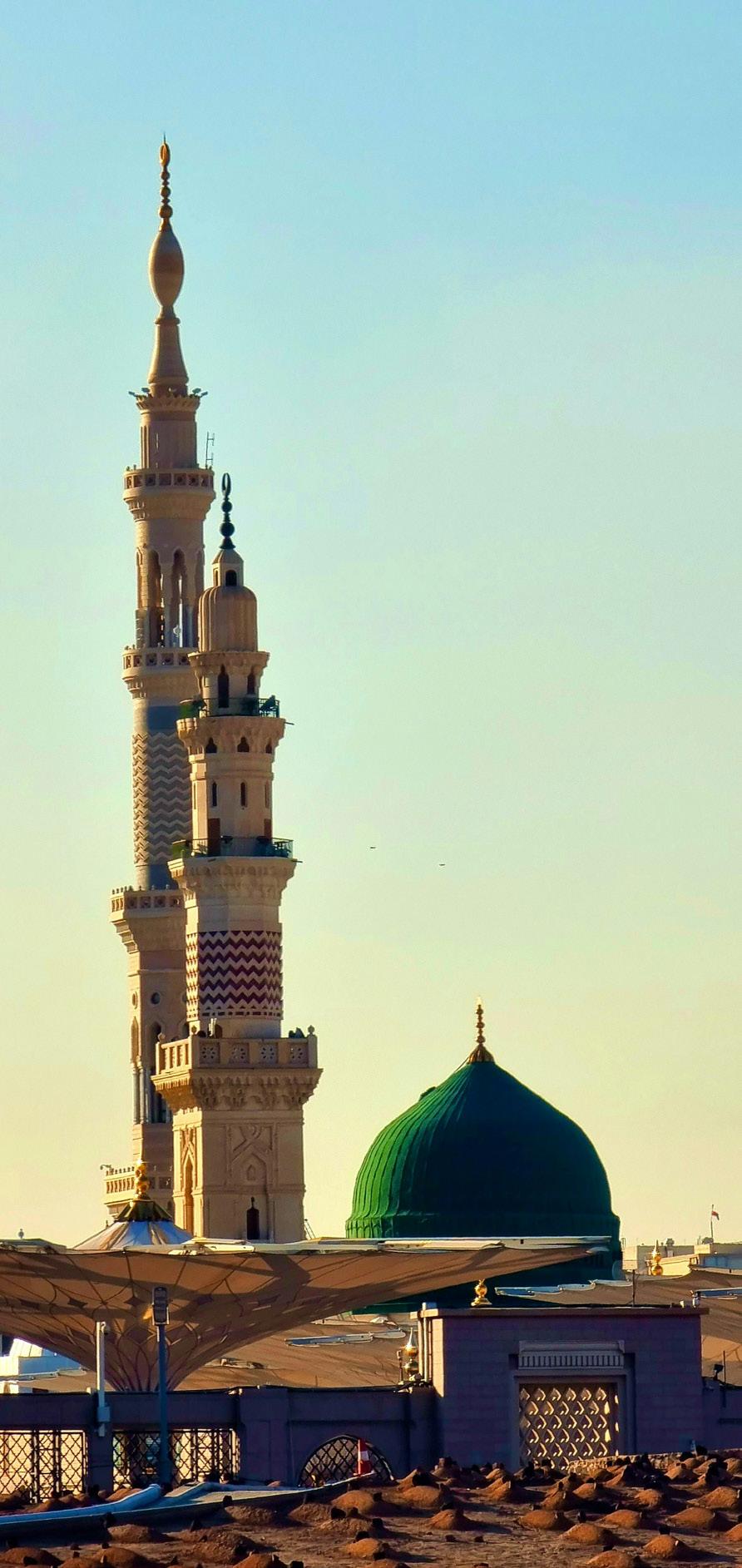

into that love. On the Day of Judgment, the Holy Qur’ān describes him as the intercessor who will pray for his people. He is reported to have said, “Every prophet has one supplication that is answered, and I wish to reserve mine as intercession for my people on the Day of Resurrection”.8 This shows his love for Allah expressed in concern for humanity’s salvation.
Looking at his life in full, one sees that his love for Allah was expressed in three ways: in his worship, in his morals, and in his sacrifices. His worship was unceasing, his morals radiated divine attributes, and his sacrifices showed that nothing in this world mattered more to him than God. This is why the Holy Qur’ān calls him “a mercy for all the worlds”.9 That mercy was not of his own making, but the outflow of his heart, saturated with the love of Allah.
When believers today wish to draw nearer to God, they must look to the Holy Prophet’ssa example. His sunnah shows that love is proven by consistency in prayer, sincerity in obedience, compassion in society, and patience in trials.
Thus, the Holy Prophet’ssa love for Allah was not a private sentiment but the very axis
around which his entire mission revolved around. It inspired his tears in prayer, his kindness in society, his forgiveness of enemies, his endurance in persecution, and his yearning for the forgiveness of his ummah. Mercy, gratitude, patience, sacrifice, all were expressions of his heart’s love for Allah, a love so deep that it continues to illuminate hearts across centuries until the day of reckoning.
References:
1. Holy Qur’an 3:32
2. Sahih al-Bukhārī, Kitāb al-Tahajjud
3. Sahih Muslim
4. Sahih al-Bukhari Kitāb al-Īmān
5. Sunan al-Tirmidhī
6. Life of Muhammad, Pg 28
7. Durr-e-Samin, Urdu poetry collection
8. Sahih Muslim, Kitāb alĪmān
9.The Holy Qur’an 21:108

By Dr M. Masood Ul Hassan Nuri Sahib Heart specialist, Administrator Tahir Heart Institute Rabwah
I got up early around 6:00 am for my adventurous trip to Nandana Fort in Pind Dadan Khan, Pakistan. I was excited about the visit Al-Biruni, the 11th century Persian scholar, who lived & travelled in India. This attracted my attention for two reasons:
Firstly, it is the same place which is believed to be Abu-Rayhan Al-Biruni’s observatory where he quantified the radius and circumference of the earth. Secondly, in the context of Al-Biruni’s treatise, ‘Kitab al Hind’, a crucial historical source, where he noted Jewish presence in Kashmir.
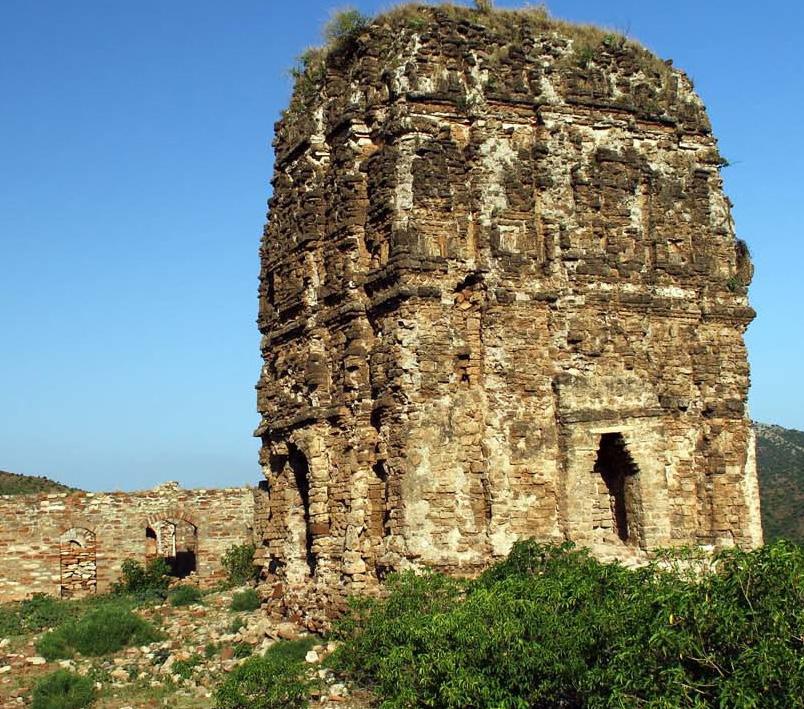

all three. I had a Cappuccino and my colleagues had tea. Soon we sped off to Pind Dadan Khan where Malik Riaz (historian, archeologist) greeted us. The onward journey was to Nandana Fort in the Baghawalla village. It is famous for its historical and scientific significance. Here AlBiruni, an 11th century Muslim scholar measured the earth’s circumference. He utilized trigonometric calculations, measuring the angle of the dip of the horizon from the fort’s hilltop. The Fort had a rich history, having been ruled by several kings before being conquered by Mahmood of Ghazni.
With prayers, I departed accompanied by my guard Saqib & driver Jalal onto the motorway. It was a pleasant, somewhat cloudy morning, hot and humid. The drive was enjoyable. On my way, I scrolled through the internet getting information about the great polymath and Nandana Fort. Midway our journey we stopped by the Monal Restaurant for breakfast. It was a pleasant break and I ordered paratha omelette for
Nandana Fort’s location on the South range made it a crucial defensive position, controlling the routes connecting India and Central Asia. This was the same pass used by Alexander the Great in his epic clash with Raja Porus. We stopped by the foothills of Salt Mountains in Pakistan. Aby Rayhan Muhammad ibn Ahmad AlBiruni, nicknamed Al-Biruni was born on September 9, 973. He was a great scholar,
born in a village on the outskirts of Khwarazm.
Furthermore, he specialised in mathematics, astronomy, history, geography, and medicine. Located in the Jhelum district and surrounded by beautiful mountains, Fort Nandana is a 1,500-year-old hidden gem. We then moved on a bumpy road near the base of the mountain hill. AlBiruni’s observatory was visible. While tracking my way up to the Nandana Fort I was overawed by the genius of Al-Biruni when from this very observatory he calculated the radius and circumference of the earth. During his time, countless Muslims scientists, philosophers and intellectuals left an indelible mark on humanity, the cause of human knowledge and understanding. Their pioneering efforts brought about an unremarkable evolution in the world and their research and discoveries continue to be the basis for modern science. They utilized their God-given talents and faculties, whilst seeking help from Allah the Almighty and reflecting upon His creation, and as a result, have been recognized through history and continue to be acknowledged and reflected today.
Al-Biruni, lived here at Nandana Fort for many years & rest of India (between 1017-1020). Here, he found the diameter of earth very close to today’s value (99%). Al-Biruni developed many instruments for astronomy and geography measurements. He put forward the first ideas on the theory of gravity, which was mathematically proven by Newton 700 years before Newton. As a result of his observations with the telescope he developed, 600 years before Galileo, who confirmed that the planets revolved around the sun, AlBiruni defended the idea that the “earth rotates”. To the query of why plants and
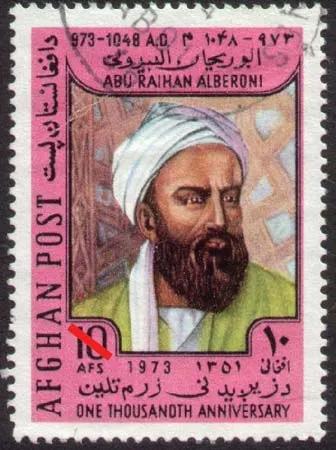
stones don’t shoot up if the earth is spinning, he answered that there is an attraction at the center and that everything in the center of the Earth’s surface. He predicted that North, South, East and West connected at a point, and there was land behind the seas (today’s America).
Al-Biruni died at the age of 75. It inspired scientists such as Copernicus and Galileo, Newton and Torricelli. The UNESCO Courier (1974) introduced Al-Biruni as “the universal genius who lived a thousand years ago in Central Asia.” According to Al-Biruni, the pleasure of knowledge, that is, the pleasure of teaching for truth and reality, is among the highest pleasures. In this regard, he states; “What is necessary and unavoidable for the men of knowledge, that’s the servant of knowledge, is not to make a distinction between the sciences, even if he is not at a sufficient level in all fields of knowledge, but to give each of them its due. Because knowledge is beautiful and its flavor is permanent. The flavor lasts throughout this research. When the research ends, the flavor ends”.
He continues; “The scholar should not look down on the scholars who came before him,
he should approach their works with modesty and benefit from them. In this way, he will reach the most accurate and solid information and will stay away from flawed and erroneous information.” While having my tour of Al-Biruni’s Nandana Hill’s observatory my thoughts wandered as to how Allah inspired the generations of Muslim inventors in the Middle Ages. As I looked back more than a millennium, I realized how Muslim scientists and inventors played a fundamental role in advancing knowledge and developing technologists, which transformed the world as we see today.
In my own field of medicine, many Muslim physicians and scientists made great discoveries and pioneered many inventions that remain in use today. Many of the surgical instruments were pioneered by Muslim physicians Al-Zahrawi`s and Al-Beruni`s time. In the 17th century, an English physician William Harvey famously carried out what we consider as ground breaking research regarding blood circulation and the functioning of the heart. However, it was later discovered that more than 400 years before Harvey`s research, Ibn Nafees, an Arab physician had already detailed the basics of pulmonary circulation. In an article published by the National Geographic in 2016 “How Early Islamic Science Advanced Medicine”, identifies the contributions of Muslim scientists in the early period of Islam:
“Physicians from Islamic countries during the late middle ages enjoyed great respect. Their reputation was well deserved for the study and practice of medicine was then led by Muslim societies across their immense territory, which extended modern day southern Spain to Iran.” It further states: “By the 900’s, drawing from a grow-
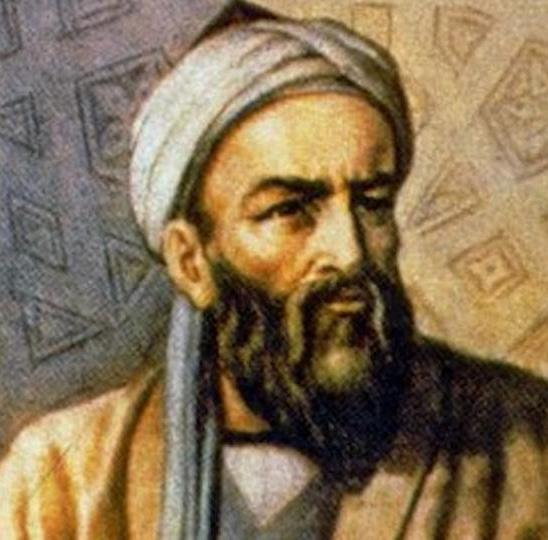
ing body of Greek, Persian and Sanskrit words translated into Arabic Islamic Medicine quickly became the most sophisticated in the world. Christians, Jews, Hindus and scholars from many other traditions looked into Arabic as a language of science. Doctors of different faith worked together debating and studying with Arabic as the common tongue”. The article continues, “The brightest star is the Baghdad firmament was undoubtedly the extraordinary Ibn Sina (a close contemporary of Al-Biruni) …his great volume Al-Qanun fi Al Tibb – Canon of Medicine – became one of the most famous medicine works of all time…(Ibn Sina)” attempts to harmonize the medical practices of the Greek thinker Galen with the philosophy of Aristotle reveals the multiple nature of the debt owed to the Muslim scholarship, which did not merely revive Greek authors but stimulated new patterns of thought for centuries ahead. The reconciling of practical science, thought and religion ensured canon was studied by European medicine until the 18th century. Moreover the National Geographic article labels the period of Muslim rule in Spain as a “period of scholarly development” and describes Cordoba in the 10th century as the “most cultured city in Europe and a great center of study and exploration”.
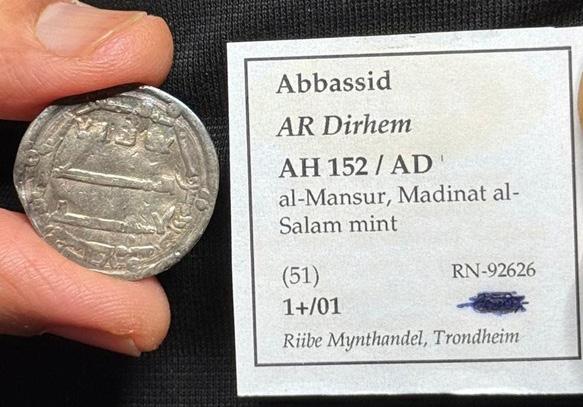
As stated by the great reformer that; “continued study of physics, astronomy and the sciences will always lead a righteous person towards Almighty. The more they learn about God`s creation and the world around them, the more they will appreciate the beauty of Allah the Almighty through the wonder of the universe”. It was in this way reflecting upon the universe, that Professor Dr. Abdus Salam spent his life and he used whatever insight he gained as evidence to prove the existence of God. As I descended slowly but carefully from Nandana Hill – the place of Al-Biruni, I lamented; “Although, the historic contributions of Muslim Scholars, like Al-Biruni are unquestionable the recent intellectual & scientific state of much of the Muslim world most regrettable”.
Over time, as Muslims moved away from God Almighty and the qualities associated with a believer diminished rapidly amongst them, the Muslims – who had previously had the world in science, medicine, and research – gradually moved to an age of intellectual ignorance that persists to this day. Instead of continuing to be Leaders of innovation and discovery, the period of Muslim academic enlightenment drew to an end. Instead of being those who gave to the world, the Muslims
became those who only took. As a result, when the world recognizes the outstanding historic contribution of Muslims to science and learning – like Al-Biruni it considers the intellectual status of the modern-day Muslim world to be useful. The truth is that, generally speaking, the Muslims world has lost its passion for education and pushing the boundaries of human knowledge. Muslim nations have immersed in the luxuries and comfort of the world and so, they no longer have the drive or motivation to toil in the pursuit of knowledge or to reflect upon the universe. Thus in intellectual and scientific terms, Muslims and the Islamic nations have gone from leading the world, to being treated with scorn and division.
As I travelled back to my place, the sun was setting. I leaned back and had a last look at Nandana Fort and prayed with tears in my eyes; “May Allah the Almighty enable us to flourish, and to achieve great success in our fields of expertise. Working with diligence, passion, and above all constantly seeking the help of Allah the Almighty at every step of our academic journey and keep His Majesty at the forefront of our minds. Amen”.
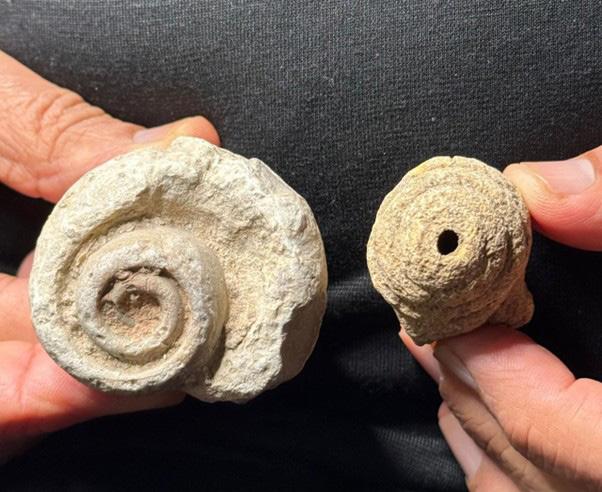
Long before I took my first breath, my mother made a decision that would define my entire life. She dedicated me to the service of Islam Ahmadiyyat through the blessed scheme of Waqf-e-Nau. From that very moment, my life was no longer mine alone, it was a trust, a prayer, a hope that one day, I would serve the Promised Messiah’sas Jama’at under the banner of Khilafat-e-Ahmadiyya.
By the grace of Allah, both my maternal and paternal great grandparents took Bai’at at the blessed hands of the Promised Messiahas making them among his Sahaba (companions). They both belonged to a village called Talwandi Jhunglan, located just a few miles away from Qadian. In the early 1930’s, guided by the advice of Hazrat Khalifatul Masihra, they left their ancestral village and migrated to Sindh, Pakistan. There, they built a new home “Kot-Ahmadiyya”.
Kot-Ahmadiyya has welcomed Hazrat Khalifatul Masih IIra, Hazrat Khalifatul masih IIIrh, Hazrat Khalifatul Masih IVrh, Hazrat Amma Jaanra and many other
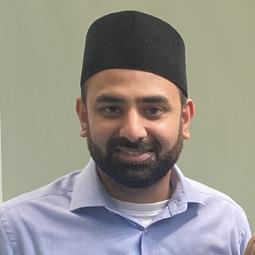
revered members of the Jama’at. These visits inculcated within us the spirit of hospitality. Our elders lived here for many decades. However, in the early 1980’s, the opportunity arose to move to Germany and that is where my story begins. I was born in the year 1992 in the quiet German town of Kaiserslautern, I am the eldest of four. My father’s name is Mahmood Ahmed ibn (son of) Ch. Munawar Ahmad Khalid.
Throughout my life, my mother has been the quiet architect of my journey. From my earliest memories, she would remind me “You are an Ahmadi Muslim and a Waqfe-Nau child, your life belongs to the service of Jama’at.” She taught me the Waqf-e-Nau syllabus, prepared me for Ijtema’at and nurtured in me a love for Tabligh. I have a somewhat faded memory of delivering a speech during a session of the National Ijtema Germany 1996, at just four years old.
My mother had me memorise the speech which I delivered with such passion and conviction that Amir sahib Germany picked me up embraced me and also gave
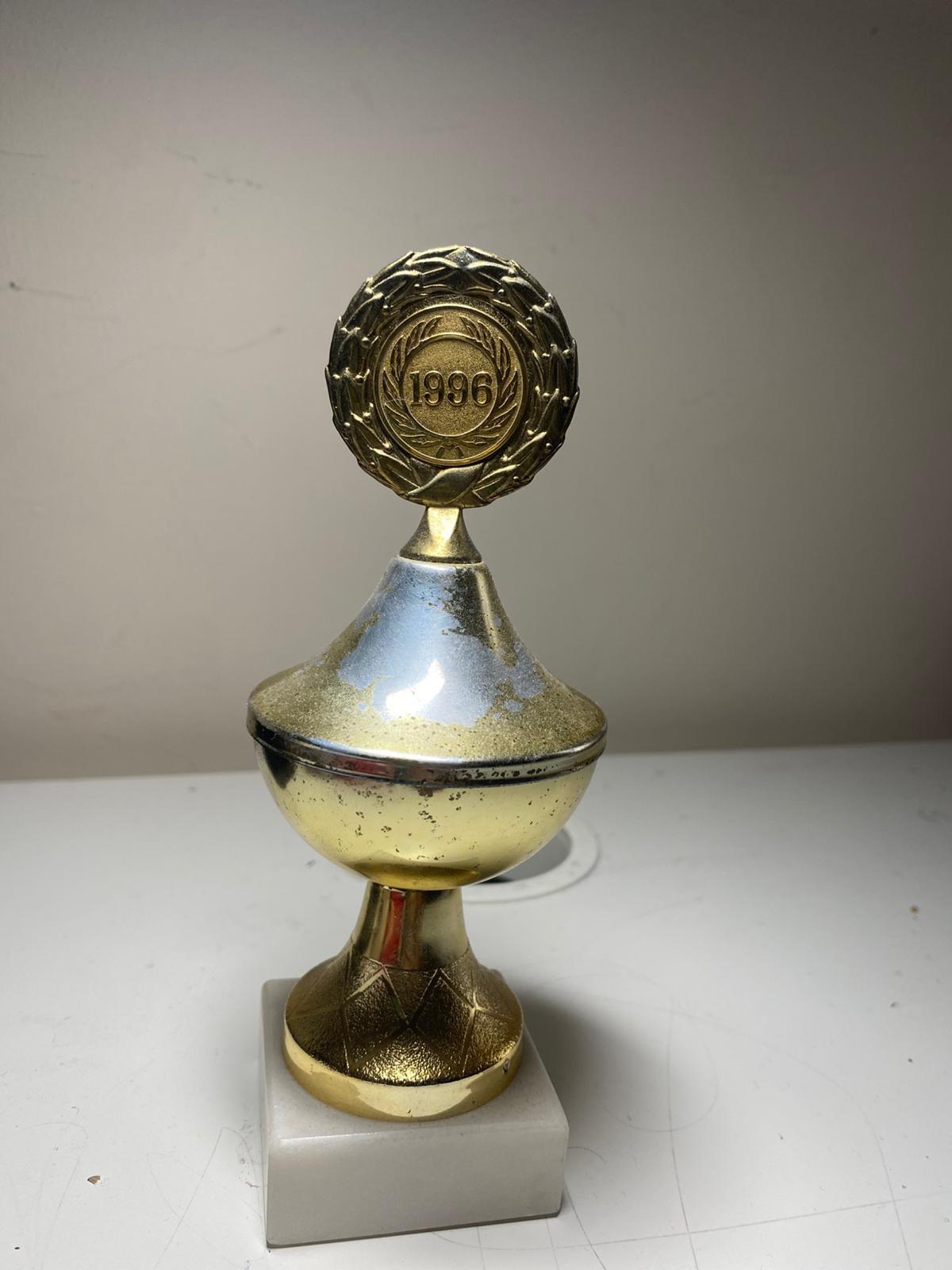
me a trophy as encouragement
The memory may have faded, but the words in that speech still run through every fibre of my body.
My first Tabligh efforts were with my grandfather Ch. Munawar Ahmad Khalid sahib, also a very passionate Dai Illallah (caller unto Allah). After Fajr, he would gather nearby family members together, and we would set out for door-to-door leafleting. I distinctly remember my mother also taking part in these efforts despite not knowing German.
I was never shy of doing Tabligh. I used to carry a pocket size book, which was a compilation of answers by Hazrat Khalifatul Masih IVrh to various questions. I would passionately debate Christian Missionaries on the streets, at times lasting hours. They were often very surprised.
My earliest bond with Khilafat began with a memorable letter. Whilst writing her usual letters to Hazrat Khalifatul Masih IVrh, my mother must have allowed me to scribble something at the bottom of the page and with that requesting prayers for me. Huzoorrh replied with beautiful prayers and at the bottom of the page, just as I had done, scribbled some lines and wrote
What am I to do? How shall I impress the hearts with this good news? What sort of a drum am I to beat in the streets in order to make the announcement that this is your God, so that people might hear?
These words of the Promised Messiahas are still very deeply rooted in my heart today. On the face of it, my mother made me memorise just a short two-minute speech. However, those words had a lifelong impact on me and instilled in me the passion of doing Tabligh.
(I am trying to answer in your language)
That letter dated 31st of August 1994 is still in my Waqf-e-Nau file today. Through MTA, I grew up with Hazrat Khalifatul Masih IVrh as my companion. I can still picture myself as a little boy, eyes glued to the screen, waiting for Huzoorrh to enter his Urdu Class. His warmth, his gentle jokes, his way of teaching, it all made me feel as though he was in the room with me. Often towards the end of the class, Huzoorrh would throw bags of food to those children
sitting far away, and praise them for their catch. I would stretch my arms out to the television, convinced that if I reached far enough, he might just throw a bag my way.
In 1999, I have my first proper memory of meeting Hazrat Khalifatul Masih IVrh when he came to inaugurate the Mosque in Wittlich, Germany. The first Mosque after the 100 mosques scheme was launched. As he walked past us, his eyes showed a light that left me standing completely still, enchanted. The following year during Jalsa Salana Germany in Mannheim, I was among the Waqifeen-e-Nau boys blessed to have Musafa (handshake) with Huzoorrh. My father advised me to make sure I kiss Huzoor’srh hands, a gesture that taught me what it means to show love and respect for Khalifa-e-Waqt (Khalifa of the time).
In 2001, my parents, guided by elders, sent me to study to better my pronunciation of the Holy Qur’an and join the Madrassatul Hifz (Hifzul Qur’an School). My passion for serving the Jama’at and involving myself in Jama’ati activities only grew whilst in Rabwah. I remember lining up in uniform for Jummah duties in Masjid Aqsa, taking part in the All Rabwah academic competition, spending long evenings playing cricket and cycling the city. Rabwah became a second home, a place where service to Jama’at was woven into every day life. Then came the day that will never leave me. While playing outside, we were suddenly called in to watch MTA. My heart sank as the announcement came; Hazrat Khalifatul Masih IVrh had passed away. Even as a boy I felt a deep, sudden emptiness, as though a protected canopy had been lifted.
Opponents of the Jama’at celebrated in the streets, but a few days later when we heard that Hazrat Mirza Masroor Ahmadaa had been elected, that feeling of protection returned, gentle and strong. Soon after being elected as Hazrat Khalifatul Masih Vaa, he instructed people to make Rabwah green. Alhamdulillah, I was able to partake in that by cleaning gutters, planting trees under the hot sun. I felt proud to serve, my Waqf was already being shaped.
By 2003, I had been in Rabwah for a couple of years, my health weakened, and my parents brought me back to Germany. Yet Rabwah had left me lessons of discipline, attachment to Khilafat and resilience.
Hazrat Khalifatul Masih Vaa for the first time
The year 2004 remains one of the brightest of my life. Although I lived in Rabwah, I had never met Huzooraa prior to being elected. This was the year that strengthened my bond with Khilafat beyond measure. At the National Khuddam Ijtema Germany 2004, I won five first prize trophies. Each one handed to me personally by Hazrat Khalifatul Masihaa. I would get up, collect the trophy, sit down and my name would be announced again. Huzooraa very lovingly remarked;
(will you take all the trophies?)
A week or so after this, I had the blessed opportunity of reciting a Qaseeda in a Waqfe-Nau class and a few days after that, during the inauguration of our local Mosque in Koblenz, beloved Huzooraa recognized me and again with a warm remark;
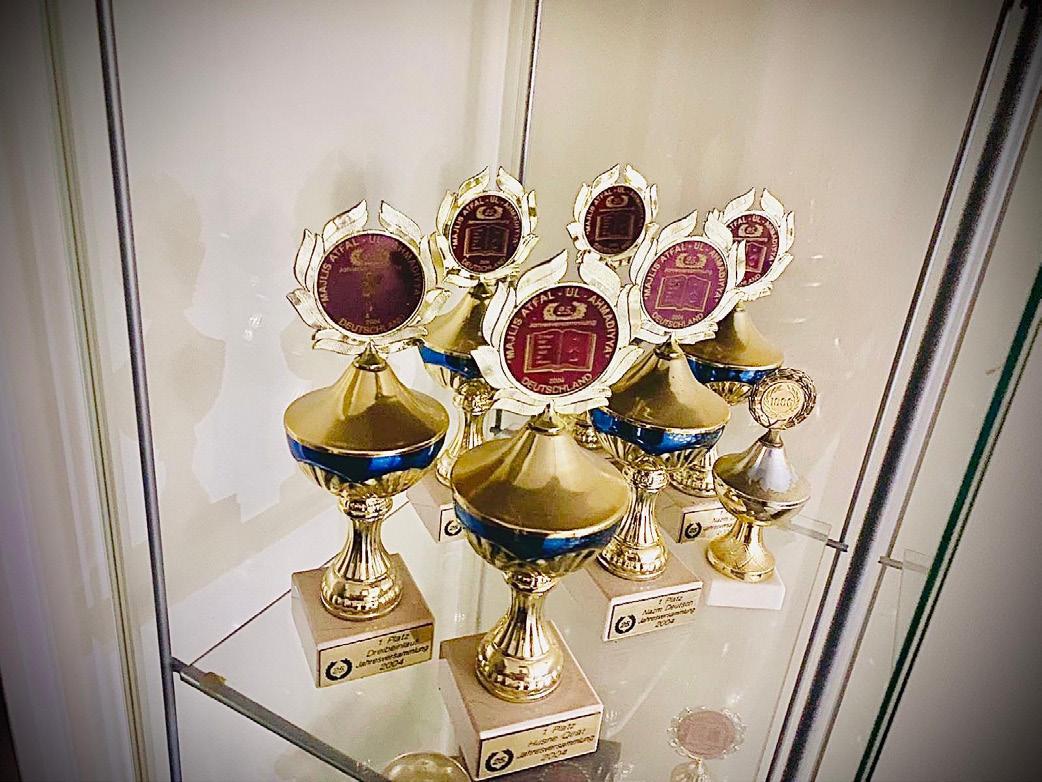
(you came here too?)
I felt humbled beyond words Soon after, in the same year, we moved to the UK — a move that opened the next stage of my journey. It was my parents’ heartfelt desire that all their children remain close to Khilafat. When we settled in the UK, one of my greatest blessings was that the connection with my beloved Huzooraa, first nurtured in Germany, continued to flourish. During those years, Waqf-e-Nau and children’s classes were at their peak, held almost every Saturday and Sunday morning. Alhamdulillah, I was blessed to attend those classes for about eight years, often reciting Qaseedah or Nazm.
My time in Rabwah had improved my Arabic pronunciation and many Arabs who heard my recitation would kindly express their admiration. All credit goes to my teachers in Rabwah, yet even now the same Qaseeda is used in the Ahmadi Answers intro, a quiet reminder of those early days. One class with beloved Huzooraa stands out vividly: a gathering in Hadeeqatul Mahdi, far from the usual studio setting. Huzooraa
instructed us to take part in a race, I came second, but the memory of running across that open field, with beloved Huzooraa smiling nearby, is priceless.
In 2007, I began volunteering for MTA, which became another defining chapter of my life. I was blessed to volunteer for many recordings. I remember during one month of ramadhan we were told to record the dars of the holy Qur’an delivered by late Syed Mir Mahmood Ahmed Nasir Sahib which used to take place in Fazl Mosque after Fajr prayers. I used to get up very early for those, take the bus and travel 45mins to an hour, set up, record and then leave to go home and get ready for school.
The greatest privilege however was serving on Huzoor’saa recording team, from 2007 to 2012 I spent countless hours in close proximity to my beloved Huzooraa. If I wasn’t sitting in the Waqf-e-Nau classes, I would be part of the MTA team recording the classes. In order to be part of these blessings, I made sure that weekdays were for school, but evenings and almost every weekend belonged to MTA.
As I finished with school, I requested a mulaqat with beloved Huzooraa to seek guidance. It was my parents wish that I join Jamia. However, I wanted to pursue my interest in MTA. When I presented this to beloved Huzooraa, he kindly left both options open, advising me to follow my interest. Having already lived in a hostel in Madrassatul Hifz, Rabwah Jamia at that
time felt less attractive, so I chose Media studies instead.
I found a film and TV course at NESCOT College, but enrolment had closed. I decided on a gap year and in another Mulaqat I expressed my desire to do Waqf-e-Ardhi for 3 days a week and requested that only my monthly buspass be reimbursed. Huzooraa very lovingly responded
Bus pass”
What is the need for a bus pass, eat two parathas in the morning and run (carry on with your tasks)
With a big smile on his face, still Huzooraa very graciously approved my request. This further shaped my idea of what waqf is, although beloved Huzoor had approved the reimbursement of the bus pass, at the same time beloved Huzoor did my Tarbiyyat of what should be the expectations from a Waqif-e-Nau. Even if there are no means, true dedication required that we find a way to fulfil the task at hand.
When enrolment opened the following year, I joined the film and tv course and quickly immersed myself in it. Freelance opportunities followed: projects with sky sports, The FA, X Factor and small independent films that even earned me IMDB credits. I completed the course with distinction and received a scholarship for Bournemouth University where I studied TV production course.
During University, I naturally saw beloved Huzooraa less often. When I finally returned back to London and booked a Mulaqat, he greeted me with a question that pierced my heart:
(where were you for three years?)
He had mentioned the exact time I was away. The concern in his voice felt like a loving father, even now, remembering it makes me emotional. I explained that I was done with university and was now working fulltime as an employee with the National Tabligh department. A job that I had taken on just two months before the Mulaqat. Huzoor smiled and said:
(we also have our MTA, work there)
Gently suggesting that I should return to MTA. Beloved Huzooraa then instructed me to write to him formally. A week after sending the letter, I received a reply from Tabshir: beloved Huzooraa had graciously accepted my Waqf and posted me to the MTA Africa project. So, on the 14th of February 2015 my life as a Waqfe Zindagi officially began.
Alhamdulillah, 2025 marks 10 years of service with MTA Africa. Over this decade, I have travelled to 8 African countries, some multiple times, witnessing the Jama’at’s growth, seeing the vision of beloved Huzooraa come to fruition and seeing the power of his prayers at every step.
When it was time for me to get married and my parents were in search of a suitable Rishta for me, beloved Huzooraa was inspecting the MTA offices. I still remember Huzoor’s big smile, he held my In charge’s arm and said:
(next time you go to Africa, arrange a (suitable) match for Luqman there)
Even a light-hearted remark from Huzooraa carries huge blessings. Soon after, approval came for my trip to Sierra Leone, Huzooraa wrote dua on the letter with his own hands. It was during this trip that a Rishta was proposed to me by a Murabbi sahib from Sierra Leone. I knew this was a fulfilment of Huzoor’saa prayers for me. Allah Almighty even accepts a light-hearted comment that comes out of Khalifatul Masih’s mouth. Subhanallah!
A few years into my Waqf, my father pointed out that I had never served in Khuddamul Ahmadiyya. It dawned on me, that half of my Khuddam years had passed by and that I only had about 14 years left. So, I joined the National Aitmaad team and worked under Mian Waqas sahib. In 2021 I was appointed Qaid Majlis Epsom, until then my life had largely been in close, Jama’ati circles. Now, I met ordinary Khuddam, Atfal, their parents and their everyday challenges. This role shaped me into a more well rounded individual and allowed me to assist many in their personal struggles. Alhamdulillah, those moments of quiet service have been among the most fulfilling.
Looking back, every step of my journey is proof that Allah had accepted my parents and in particular my mother’s prayers and the sacrifices she made to see me where I am today, it is now up to me, to see it to the very end and do the same for my own children, who are also part of the blessed Waqf-e-Nau scheme. My mother dedicated me before birth, nurtured me with love and reminded me daily that my life belonged to Hazrat Khalifatul Masih.
If you walk under the shade of Khilafat, your life will never be wasted. My story is not mine alone, it is a mother’s wish, a family›s sacrifice and prayers of Hazrat Khalifatul Masihaa, woven together by the grace and mercy of Allah Almighty.

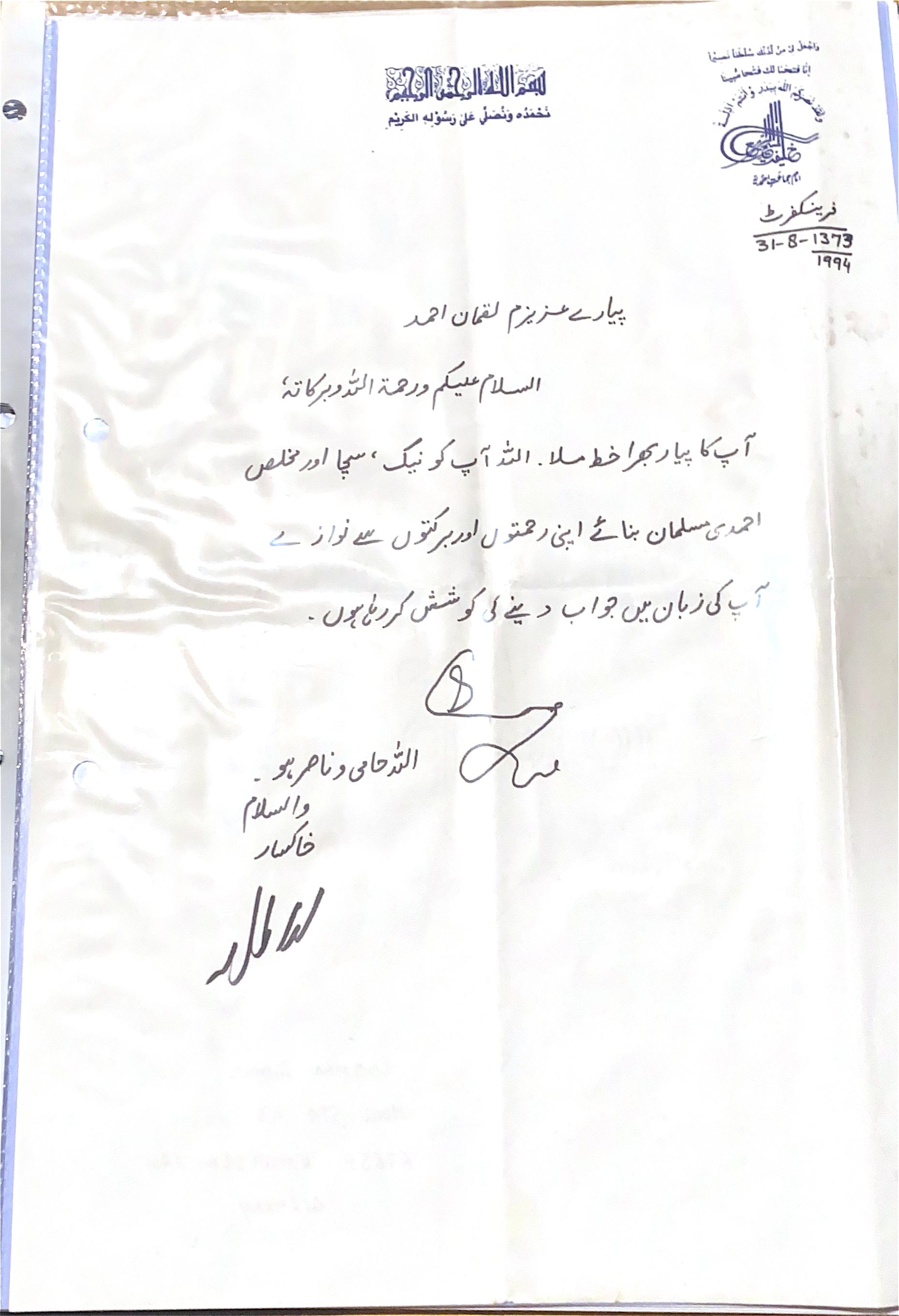
In order to safeguard ourselves from the onslaughts of Satan and to attain refuge in an invincible and tall citadel of Allah’s protection, Hazrat Khalifatul Masih Vaa encouraged us all to pray these particular prayers
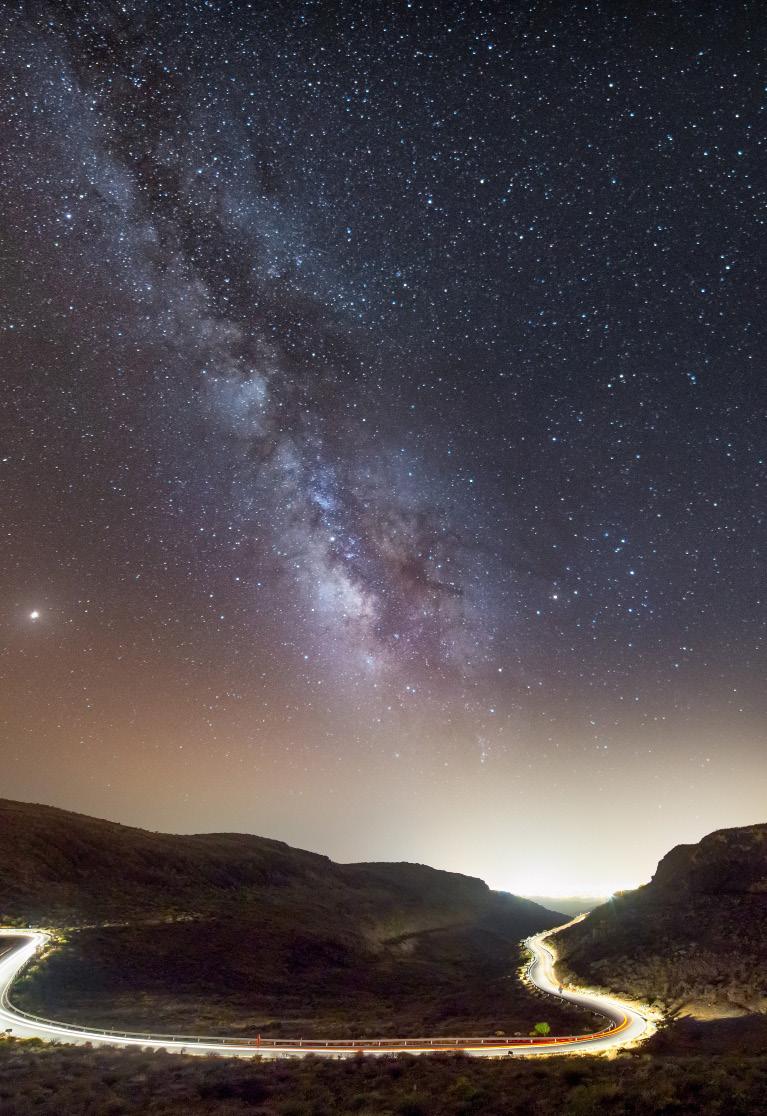
“‘Holy is Allah and worthy of all praise, Holy is Allah, the Great. O Allah, send down Your blessings upon Muhammad and upon the progeny of Muhammad.’
I seek forgiveness from Allah, my Lord, for all my sins and turn to Him
“‘O my Lord everything serves You. So O my Lord, protect me and help me and have mercy on me.’
“Those of middle age, from 15 to 25 years old, should recite it at least 100 times. Children should recite it at least 33 times. Little kids should be helped by their parents to recite it three or four times. Additionally, everyone should seek forgiveness (Istighfar) 100 times.
Rizwan Safir Archaeologist

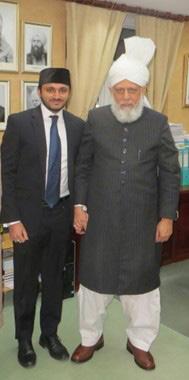
I studied a Masters in Middle Eastern archaeology and have worked on archaeological and museum projects for the past 15 years across the Middle East region, including in; Egypt, Sudan, Jordan, Palestine, Saudi Arabia, Qatar, the UAE and Oman.
Could you tell us a little about your journey as a Waqf-e-Nau and how it led you to become an archaeologist?
I was born in Jeddah, Saudi Arabia. Growing up, my parents would regularly take me to Makkah and Madinah and I had the opportunity to perform both Hajj and multiple Umrahs. On every visit, I was intrigued by the changing landscape of both holy cities. In the early 90s, historical buildings surrounding Makkah and Madinah could still be seen, some of which dated back to the era of the Holy Prophetsa.

Over the years, these vanished and by the time I returned with my family to the UK, Makkah and Madinah were unrecognisable, transformed into modern mega-cities. Traditional buildings and mosques were replaced with skyscrapers and neon logos of the world’s most familiar brands. This ignited a desire within me to explore and preserve our past; before it was lost forever.
I returned to the UK in 2000. Several years later when reviewing degree programmes for university, I came across courses in archaeology which seemed the perfect fit. I was still unsure if this aligned with a career
that Waqf-e-Nau could pursue. My family requested a mulaqat with beloved Huzooraa to seek guidance on this question. And so, I humbly requested Huzoor’saa advice on this matter, to which Huzooraa immediately responded, “yes” and continued, “find Noah’s Ark”.
I was astonished. I did not expect such a comprehensive approval for an area of study that perhaps seemed niche or trivial. Instead, Huzoor’saa response was a clear indication of the importance of such fields, where discoveries can provide direct evidence for the truth of the Holy Qur’an.
Can you share with us some instructions or guidance from the Khulafa that highlight the importance of Waqifeene-Nau pursuing the field of Archaeology?
“Please send your children into the field of archaeology to become experts… If there is a passion and interest in this research please go into this area. Their rizq will be provided by God, but we should send our children into this field”
Hazrat Mirza Tahir Ahmadrh, Darsul Quran 13th February 1995 - Surah Aale Imran verses 184-185
The above quote is one of many from Khalifa IVrh where he strongly encouraged Ahmadis to pursue such careers, to discover hidden truths outlined in the Holy Qur’an.
Similarly, our current Huzooraa has personally encouraged many Waqifeen-eNau to enter this field – all other Waqifeene-Nau archaeologists I have spoken to have received guidance from Huzooraa that strongly advocated for this career path.
The writings of the Promised Messiahasand past Khulafa are replete with examples of
past civilisations, offering learnings for us in the current day. The discovery and details of past civilisations mentioned in the Holy Qur’an can only come about through archaeological research.
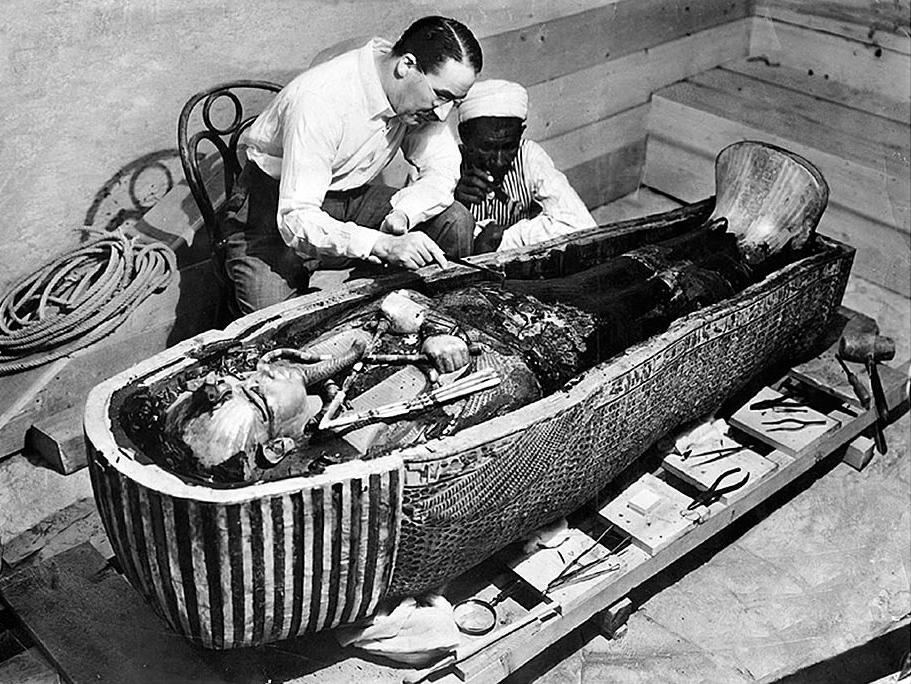
Howard Carter examines the opened coffin of the Eighteenth Dynasty pharaoh Tutankhamun with a local assistant in Luxor, Egypt, 1925. Source: Wikimedia
Speaking not long after the discovery of the Pharaoh of Moses, Khalifa IIra wrote:
“Apart from the Holy Qur’an, no other book mentions the preservation of pharaoh’s body. The discovery of this body serves as a clear testimony of the truthfulness of Islam”
Treatise on the ‘Pharaoh of Moses’ by Khalifa IIra, published in The Review of Religions, 1911
This was another powerful example of archaeology’s importance highlighted by the Khulafa. No other holy scripture claimed that Pharaoh’s body would be preserved and it was through archaeology that this 1400 year old prophecy was substantiated.
Archaeology is about discovering history. How do you connect your work with the service of Islam and the Jama’at?
of archaeological inquiry. Christians believe Prophet Noah’sas Ark literally accommodated two of every animal on earth, leaving Christian archaeologists to search for an Ark the size of a continent.
Non-Ahmadi Muslims suggest Prophet Noahas literally lived for 950 years, leaving Muslim archaeologists searching for the remains of a fairy-tale-like figure. All the while, archaeologists in academia that are either irreligious or atheists ridicule these impossible claims.
Ahmadi Muslims have a perspective that is unparalleled. We know that references to two of every animal on the Ark means two of every necessary animal that was needed for the journey. Similarly, Prophet Noahas did not live to 950 years, instead, his teachings or dynasty lasted 950 years until the advent of Prophet Hudas.
Armed with the teachings of the Promised Messiahas and the Khulafa, Ahmadi Muslim archaeologists can objectively research and seek discoveries that corroborate the Holy Qur’an.
There are several organisations within the Jama’at that bring together Ahmadi archaeologists. Most notably, the Review of Religions Archaeology Section is a dedicated platform for Ahmadi archaeologists to collaborate and publish articles, expounding the truths of the Holy Qur’an from an archaeological perspective. For more information:
Ahmadi Muslim archaeologists are in a unique position to reflect and ponder over the Qur’an’s teachings, in light

What is your favourite verse of the Holy Qur’an that highlights the need for Muslims to pursue this field?
“Have they not then travelled in the earth and seen what was the end of those before them? And surely, the abode of the Hereafter is better for those who fear God. Will you not then understand?”
(Surah Yusuf, 12:110)
This is one of many verses of the Holy Qur’an that invites mankind to reflect on civilisations of the past. Interestingly, a considerable percentage of the Holy Qur’an is dedicated to past communities and their condition. These verses provide encouragement for Ahmadi archaeologists to reflect and search for the remnants of past civilisations.
Many Waqifeen-e-Nau children dream about how they can serve the Jama’at. What advice would you give to those considering careers outside of medicine or missionary work? In particular, what advice would you give to those who wish to pursue Archaeology?
My advice would be that passion and interest hold considerable merit. If someone is naturally interested in a subject area, they are more likely to excel or push themselves to achieve excellence. Like a footballer who loves his work and works for what he loves, if someone has a natural affection for their line of employment, it will undeniably yield better results. Archaeology is that rare breed of profession that combines travel and discovery with reading and research. If this is something that interests you and you can channel this passion towards a deeper understanding of the Holy Qur’an and past civilisations, then it may be the right path for you.

I cannot dissuade anyone from these two distinguished professions! That said, if someone is less inclined towards these professions and has a passion for history and archaeology, I would encourage them in this direction.

As you mentioned earlier, you are currently working in Saudi Arabia as an archaeologist. What are some of the projects you have undertaken, and are there any future projects you look forward to?
By the Grace of Allah, this profession has taken me to remote regions of the world. From discovering the presence of early human groups in Palestine (dating back 60,000 years ago) through to the 19th century UNESCO World Heritage Islamic site of Al Zubarah in Qatar, it has been a relentless journey.
Over the past 15 years, I have migrated from archaeological excavations into the world of museums and object research, working for the British Museum and more recently, as Head of Research on several cultural heritage projects in Saudi Arabia. It has also given me the opportunity to work in Makkah and Madinah, uncovering artefacts related to both Masjid Al Haram and Masjid Al-Nabawi.
It is only through the blessings of Waqf and the prayers of beloved Huzooraa that I could return to the place where this interest first began, working on projects that protect and preserve the heritage of the two mosques.
Looking back at your journey so far, what has given you the most satisfaction as a waqf serving in this unique field?
The growing contingent of Ahmadis and Waqifeen-e-Nau in related fields has been an immense blessing and source of satisfaction. Only through collaboration can we achieve any results and collectively, undertake research related to the Holy Qur’an.
Archaeology is a broad field covering every civilisation of the world and numerous scientific specialisations. We now have specialists in languages, Egyptology, Mesopotamia, early human development, environmental history and more.
I hope and pray that we may fulfil the desire of our beloved Huzooraa and achieve excellence in our respective fields, demonstrating the truth of Islam and Ahmadiyyat.
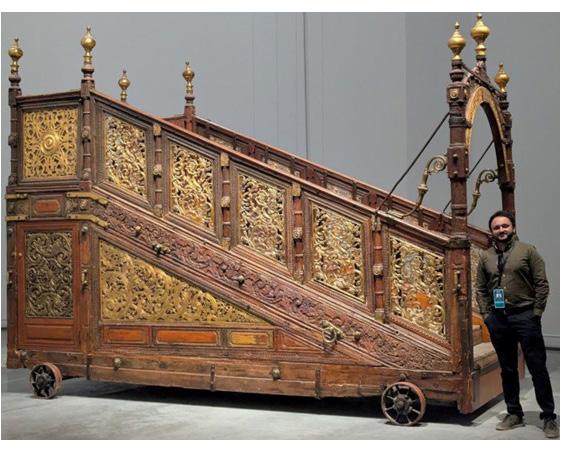
By the Grace of Allah, the National Waqfe-Nau Department of Canada Jama‘at held its 8th annual Waqf-e-Nau Ijtema on Saturday & Sunday, September 13 & 14, 2025, for both Waqifeen-e-Nau and Waaqifat-e-Nau
The Ijtema of Waqifat Nau was held on Saturday September 13, 2025 in the Baitul Islam Complex, the National Headquarters of Ahmadiyya Muslim Jama‘at Canada.
Similarly, the Ijtema of Waqifeen-e-Nau was held on Sunday September 14, 2025 in the same vicinity.
The theme of the Waqfe Nau Ijtema this year was “Waqf: A true Sacrifice”. The presentations were prepared with this theme in mind. Preparations for the Ijtema began 2 months prior to the date of the Ijtema. A duty chart consisting of various departments was formed and a number of meetings were held to work on the program and various other logistics. After registration and breakfast which began at 10:00 AM, Respected Lal Khan Malik Sahib, Amir Jama‘at Canada, chaired
the opening session which began with the recitation of the Holy Qur’an by Hafiz Wasib Dheendsa Sahib followed by its English translation Shayan Ghalib Sahib and Urdu translation presented by Kamran Hadi Sahib. This was followed by a few couplets recited from a Poem of Hazrat Masih Maudas by Qaiser Mubariz Sharma Sahib. The introductory remarks and message of Syedna Huzoor-e-Anwaraa was then delivered by Respected Lal Khan Malik Sahib, Amir Jama‘at Canada.
The Waqifeen-e-Nau were split into 4 groups based on grade level:
1. Grade 2-5
2. Grade 6-8
3. Grade 9-12
4. Post- Secondary Students & Work/Professionals
The Program of the Ijtema consisted of interactive presentations and motivational talks. Each group was catered to based on many factors including age, future aspirations, interests etc. Some of the topics which were addressed were:
• How can I best serve as a Waqif-e-Nau
• The Sacrifices of Hazrat Ibrahimas
• Tours of Jamia Ahmadiyya
• Blessings of Life Devotion
• A special Exhibition of Tabarrukaat
Apart from that, there were special sessions catered specifically for parents which included talks on ‘Raising a Waqif-e-Nau in the west, ‘Education & Career Choices for Waqifeen-e-Nau along with a Q&A session with panelists.
The total attendance of this year’s Ijtemaat was over 2167 comprising of 758 Waqifeen-e-Nau, 840 Waqifat Nau, and parents and guests.
The Waqf-e-Nau Ijtema for the Western Canada and Eastern Canada Regions is being held separately in their respective regions.
The department of Waqf-e-Nau would like to thank all Missionaries, Jamia Ahmadiyya Canada, Lajna Ima’illah, Majlis Khuddamul Ahmadiyya, Ziafat Department, IT department, Isha‘at de-
partment, Maal department, Jaidad department, Sami Basri department, MTA team, and all other volunteers for their support and dedication in making this Ijtema successful Wasalam
Muhammad Saleh
Missionary Serving in National Waqf-eNau Department
